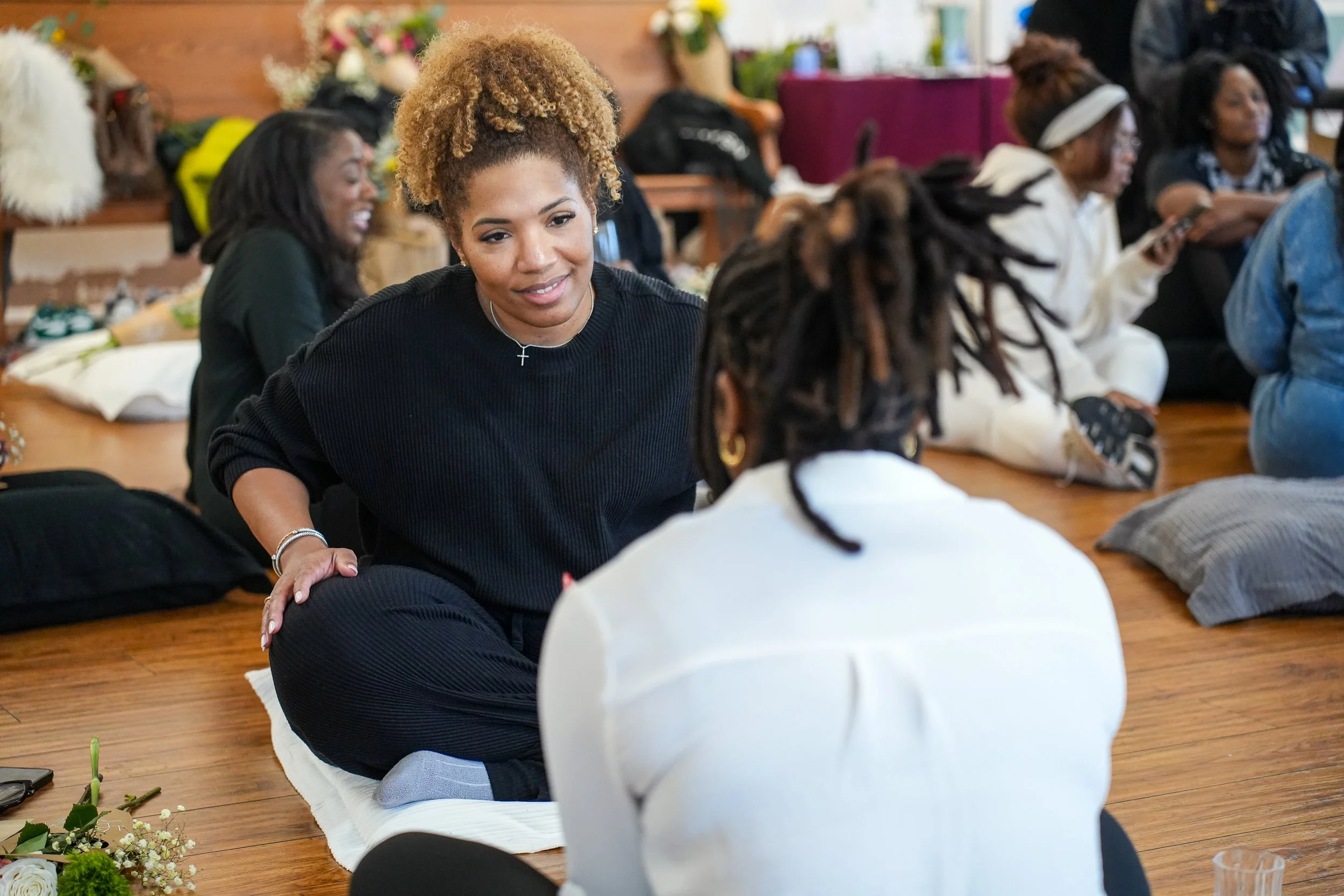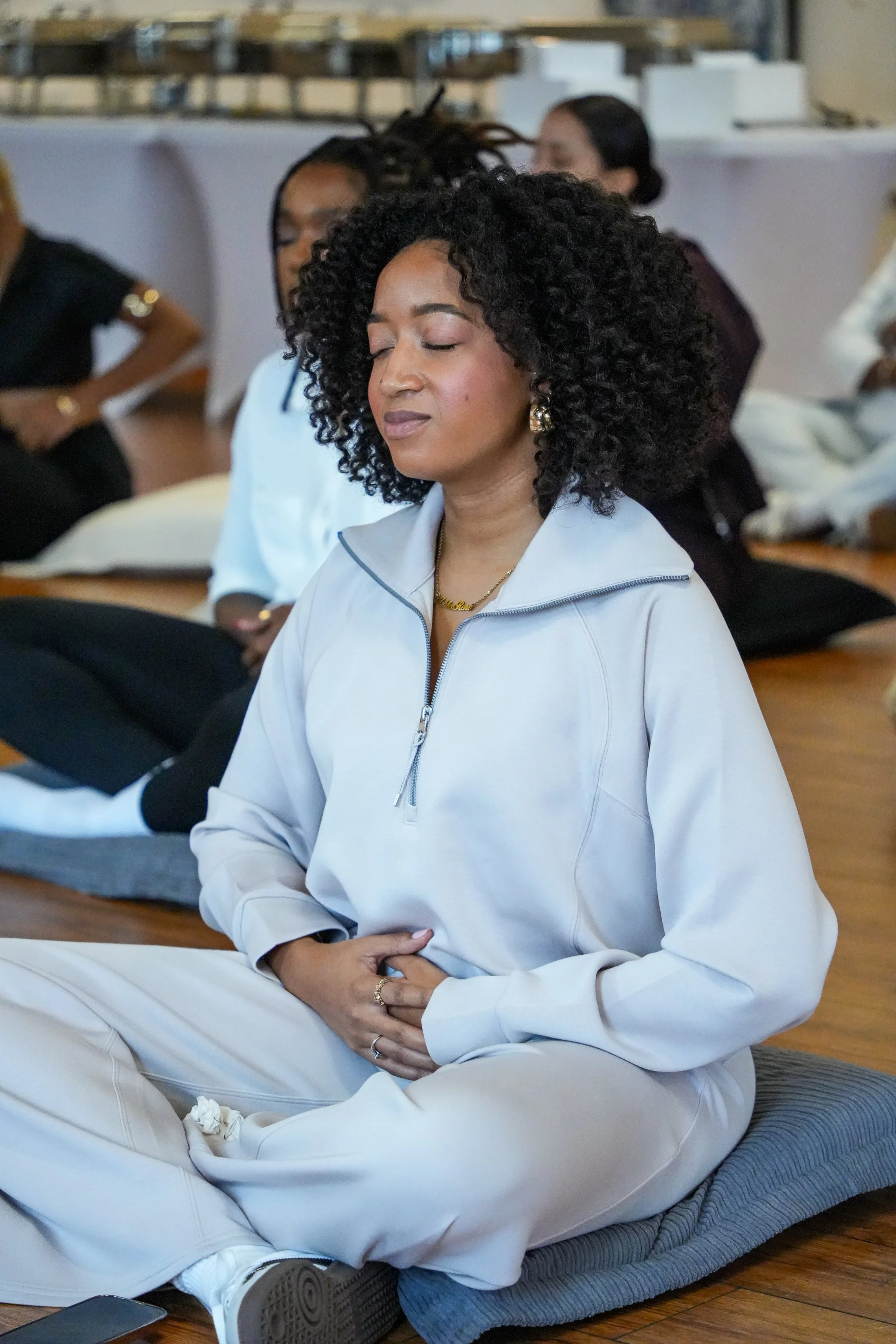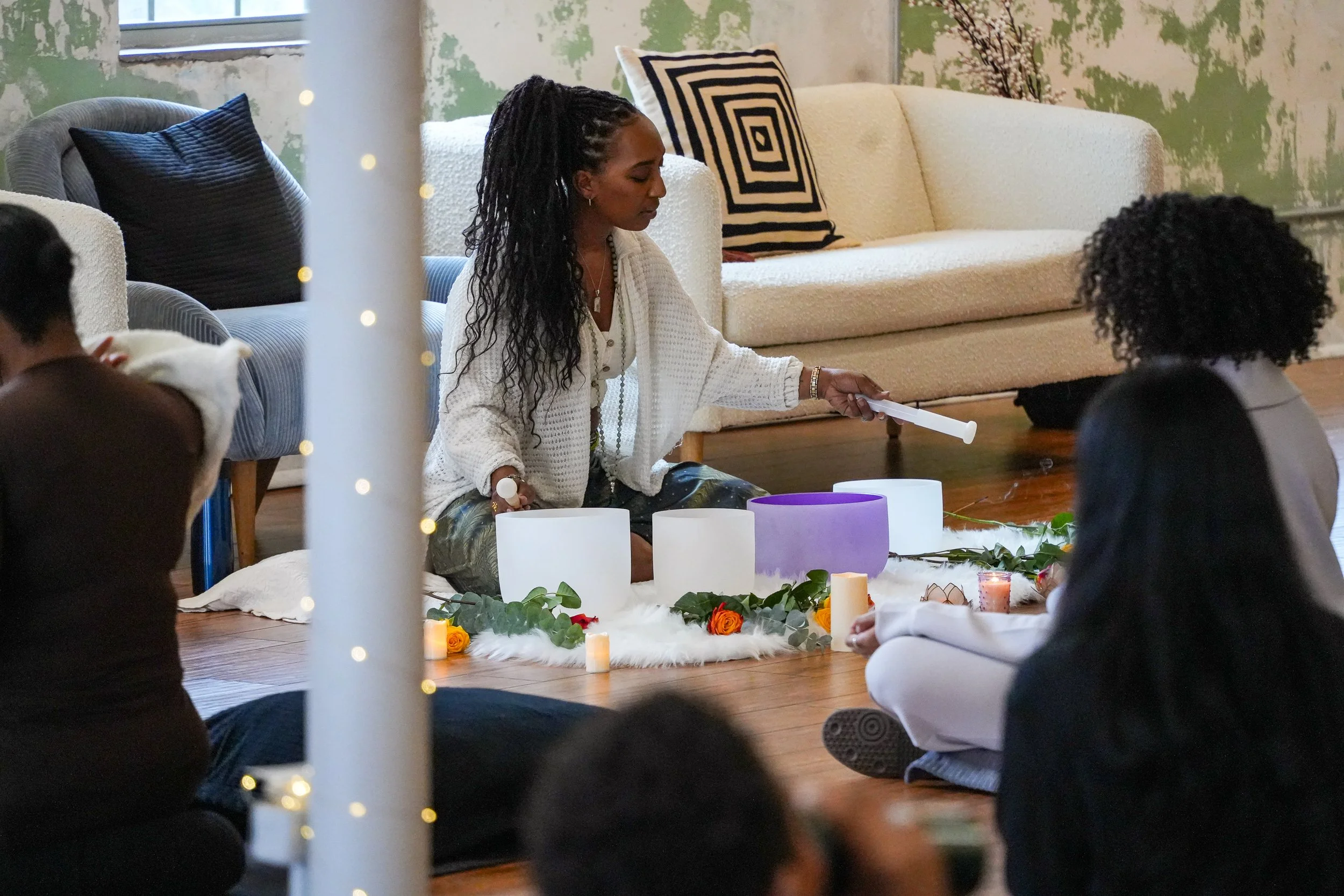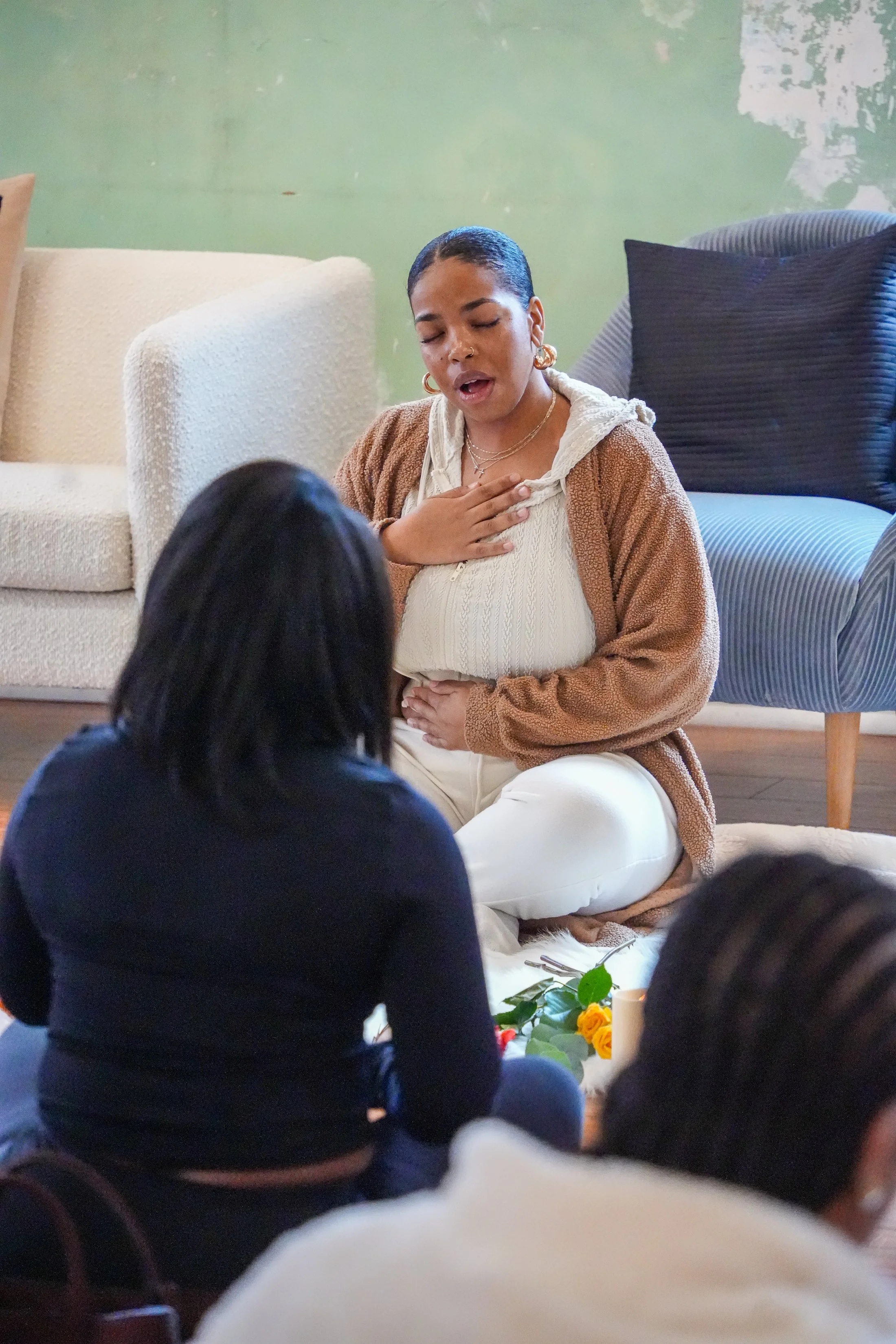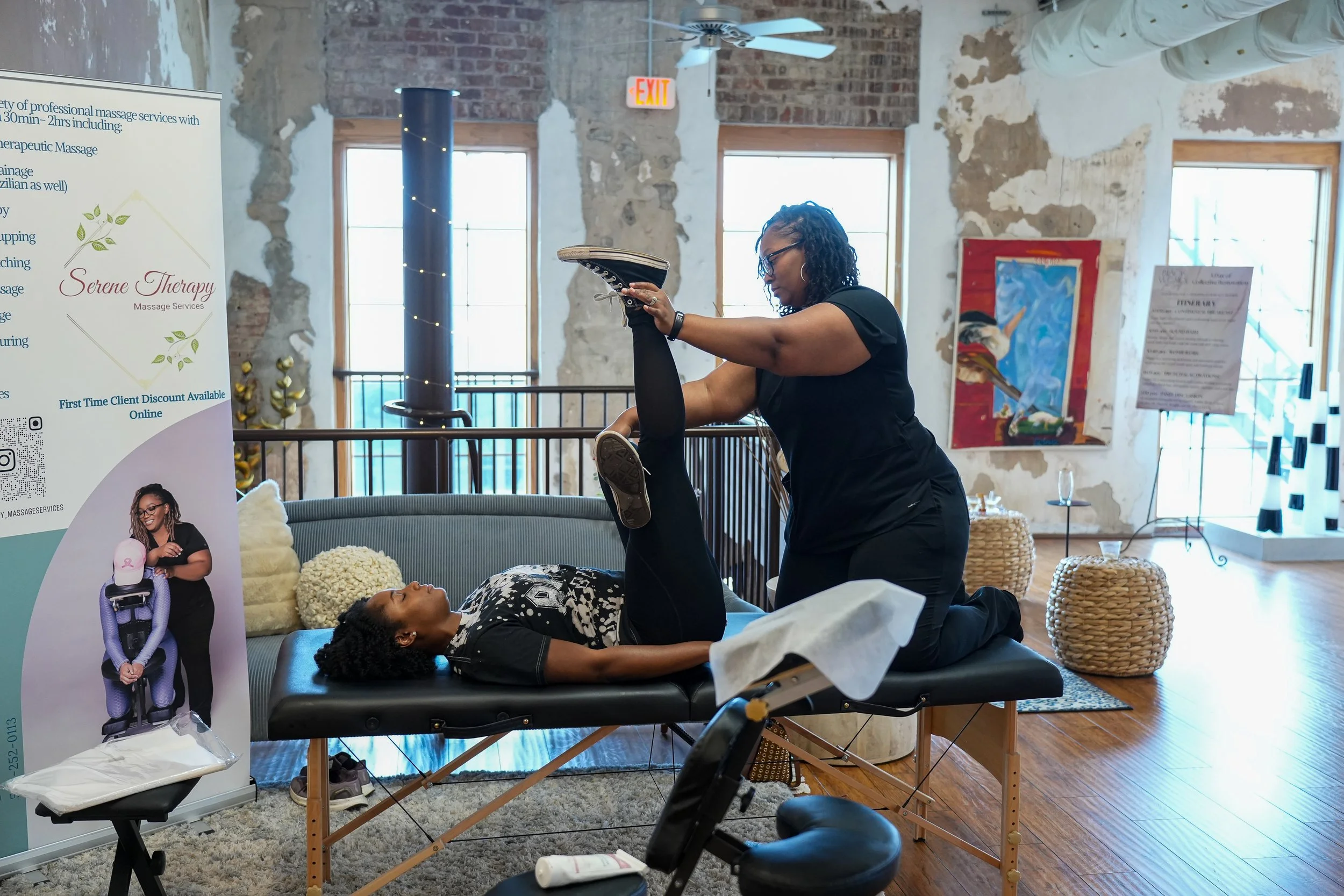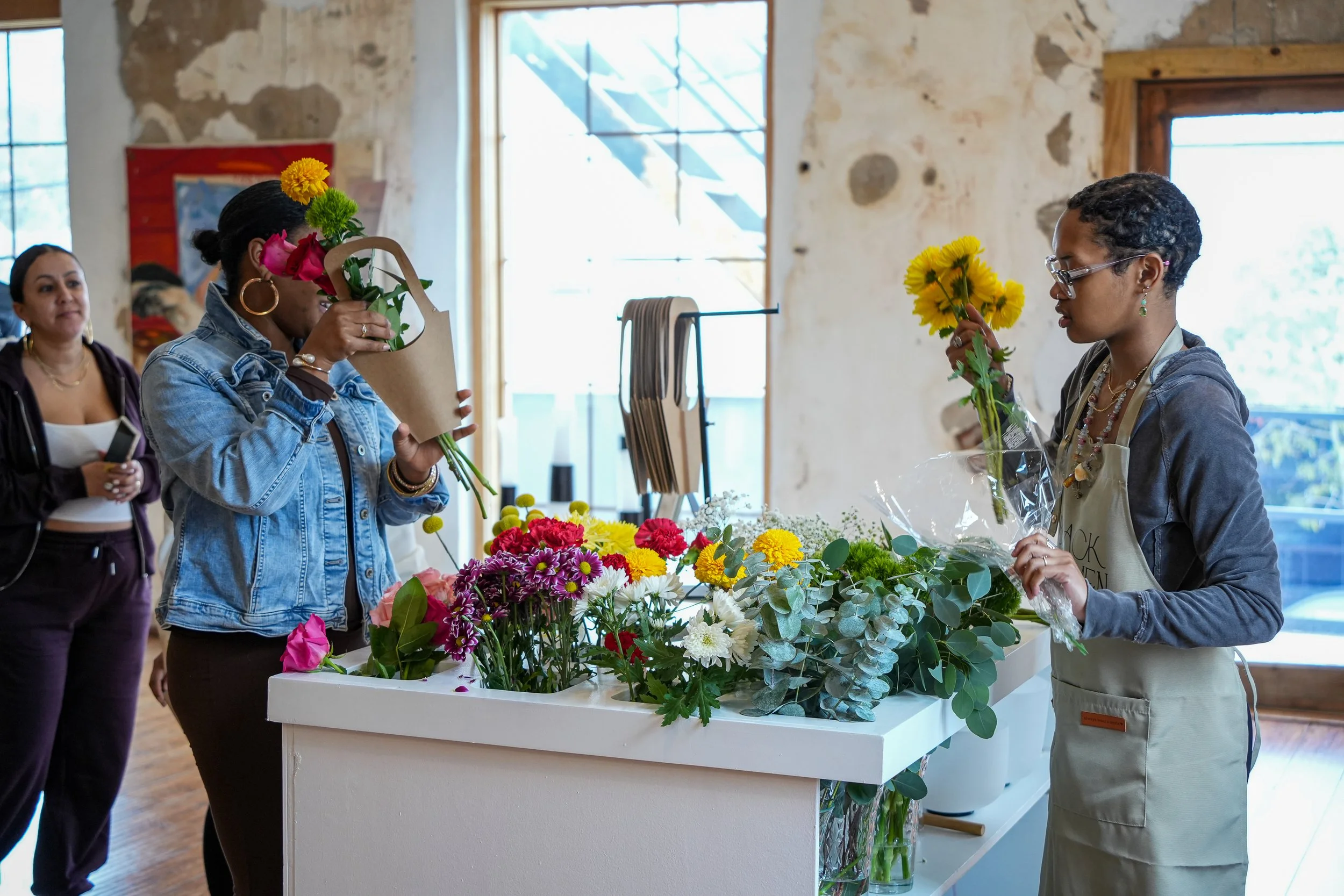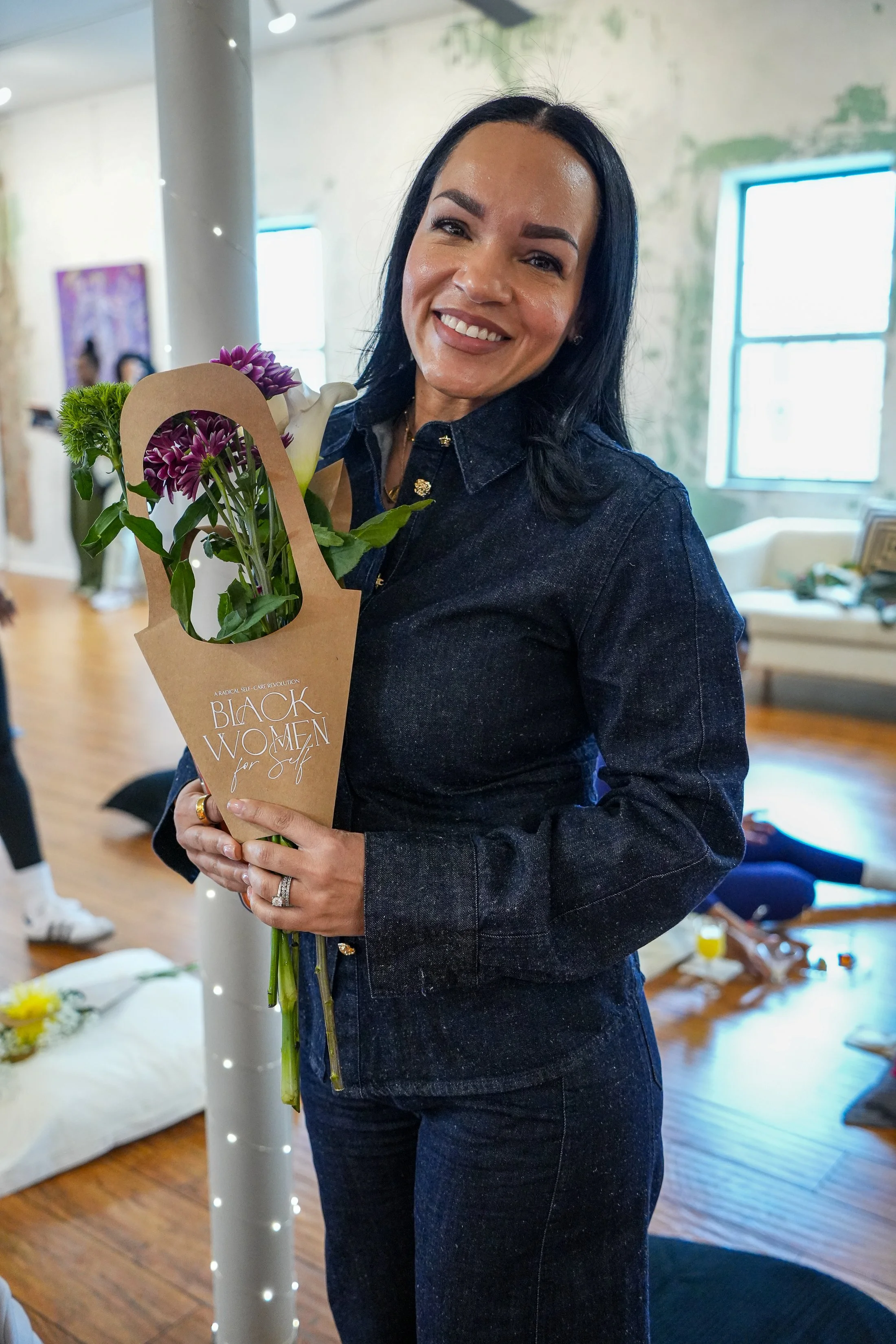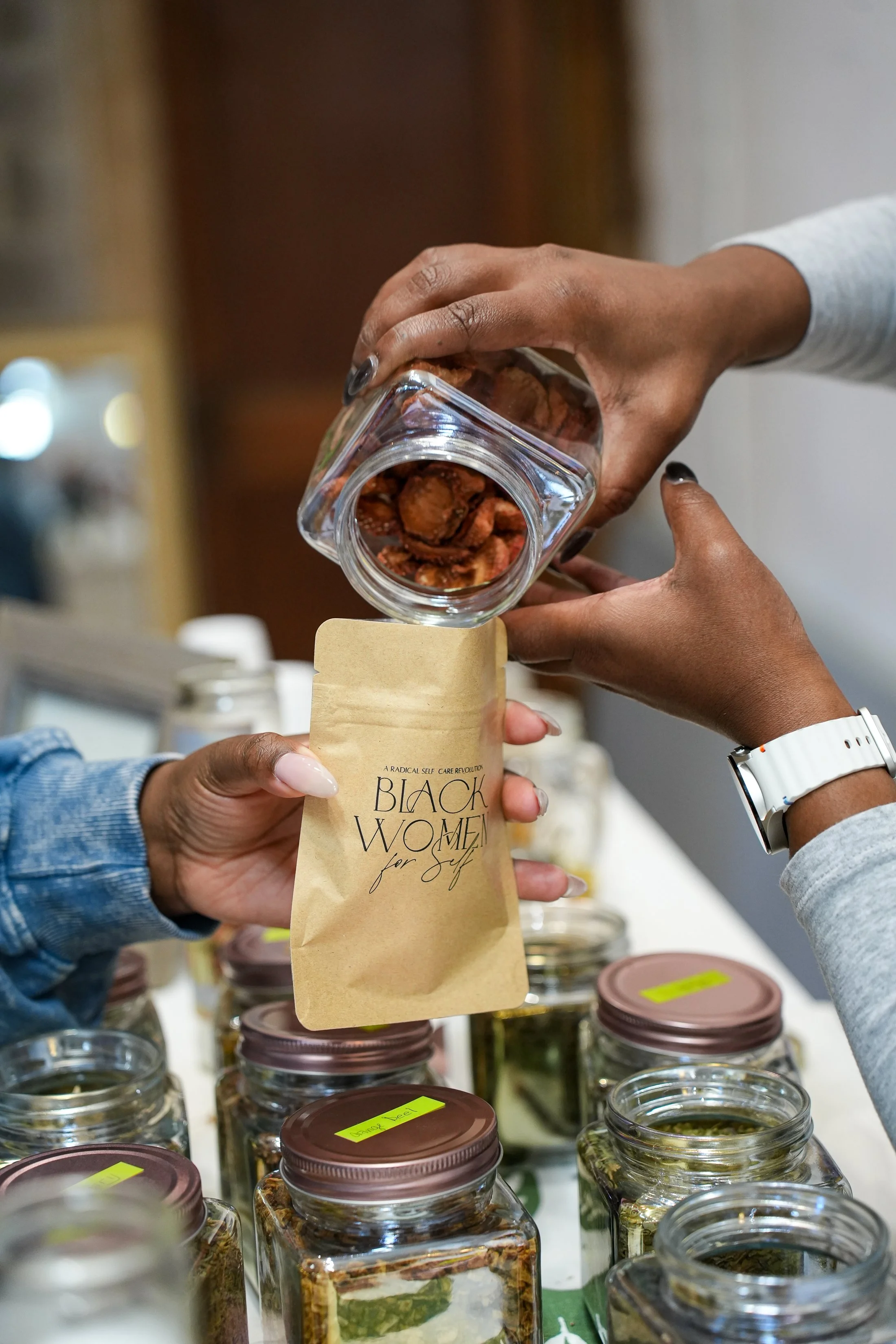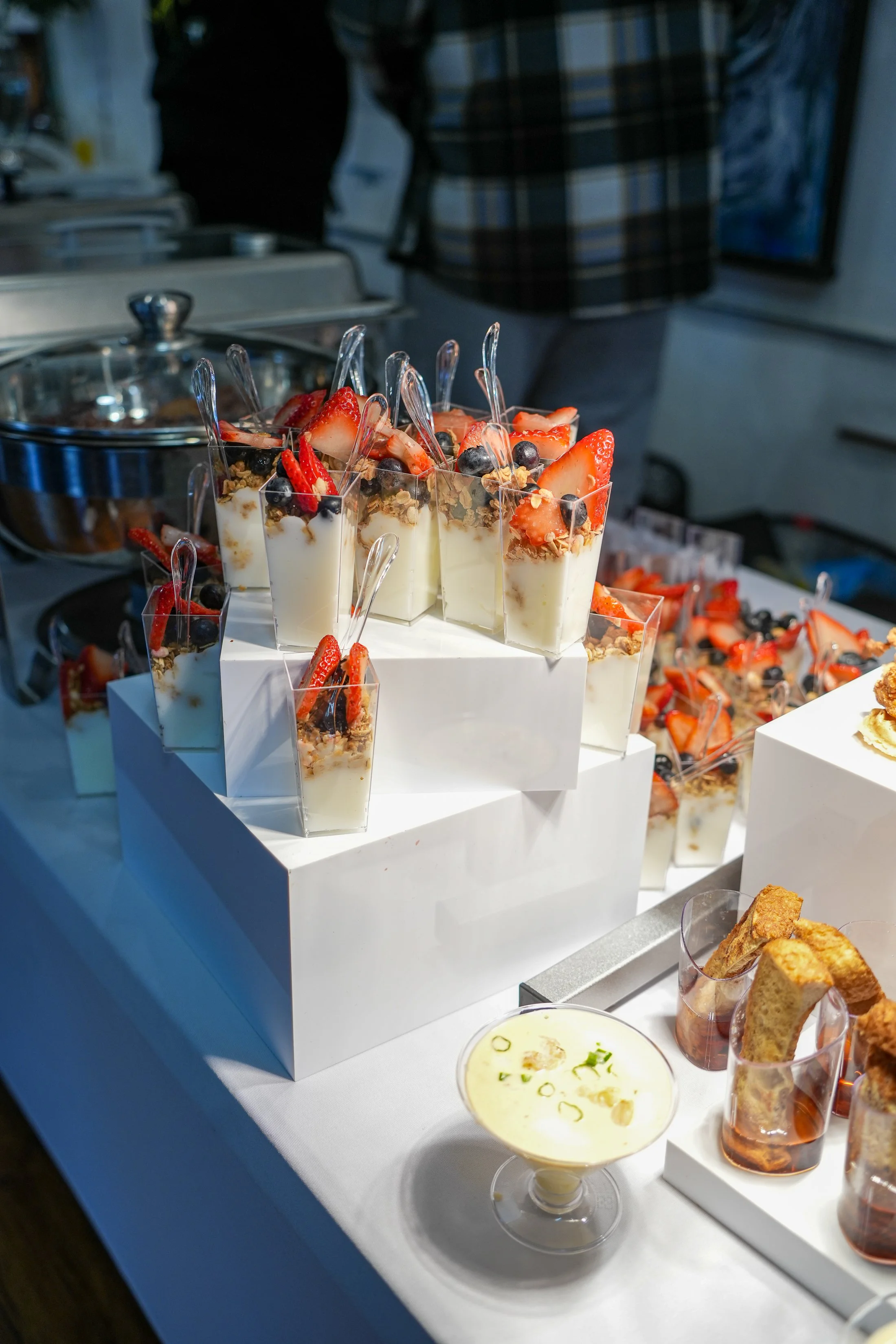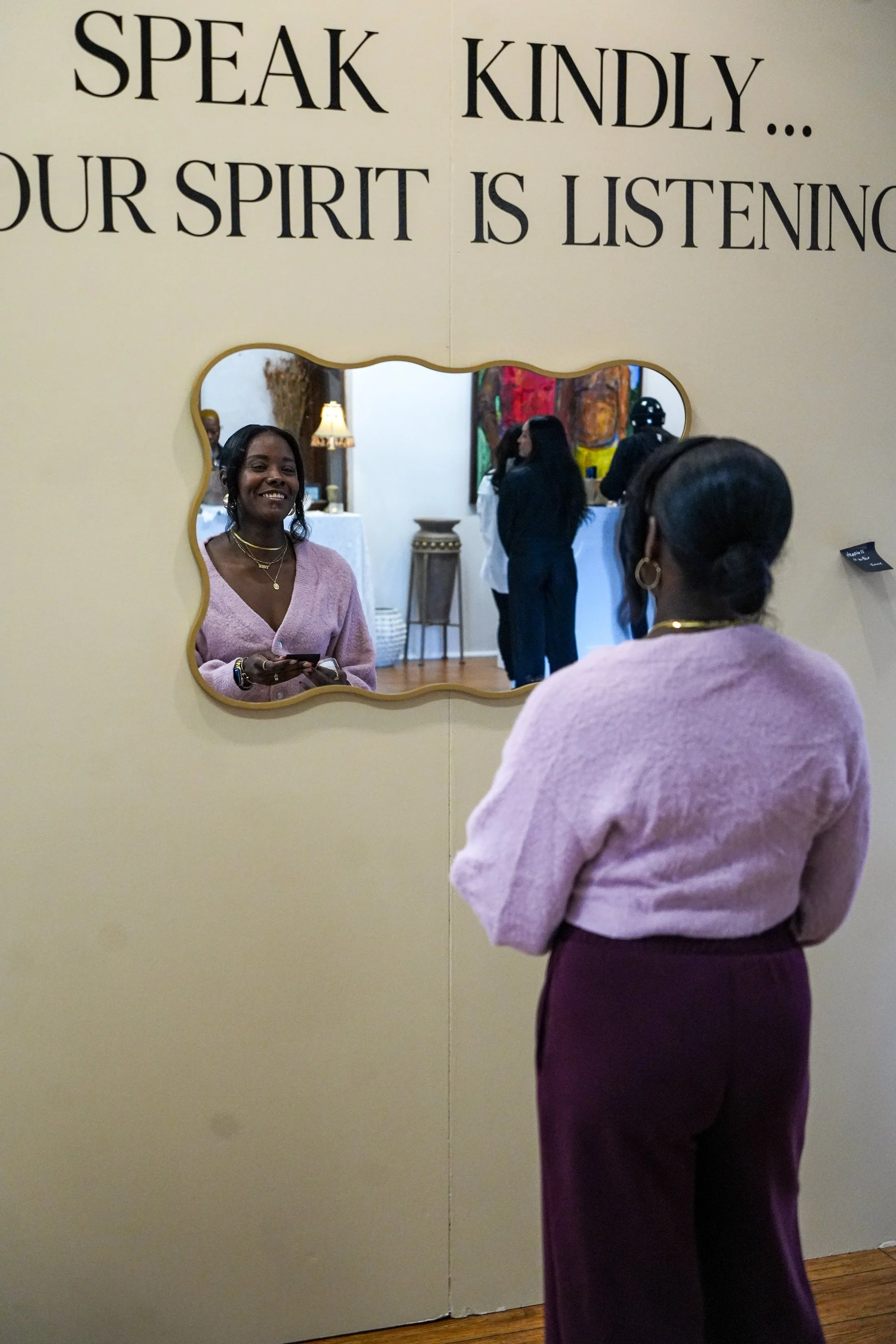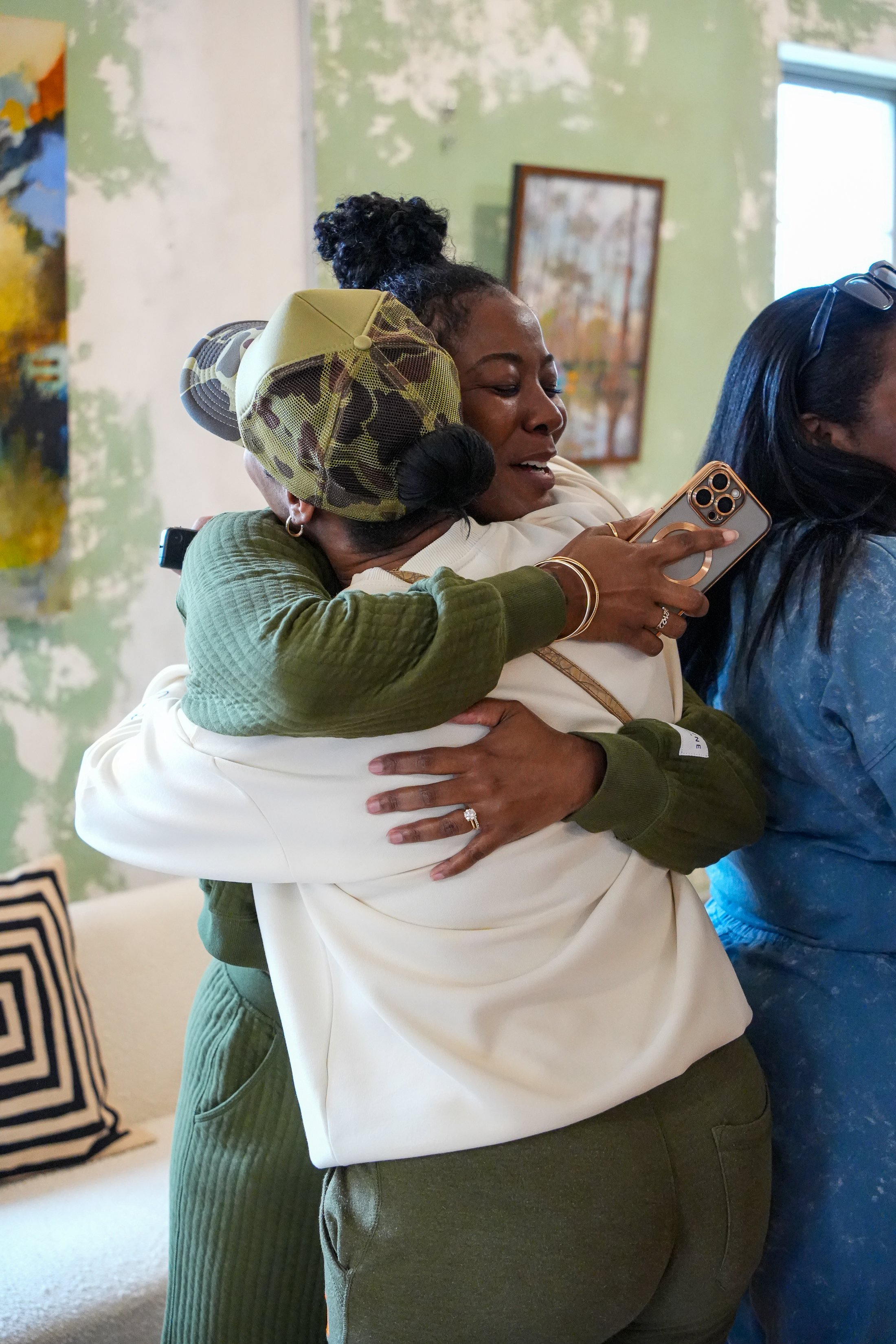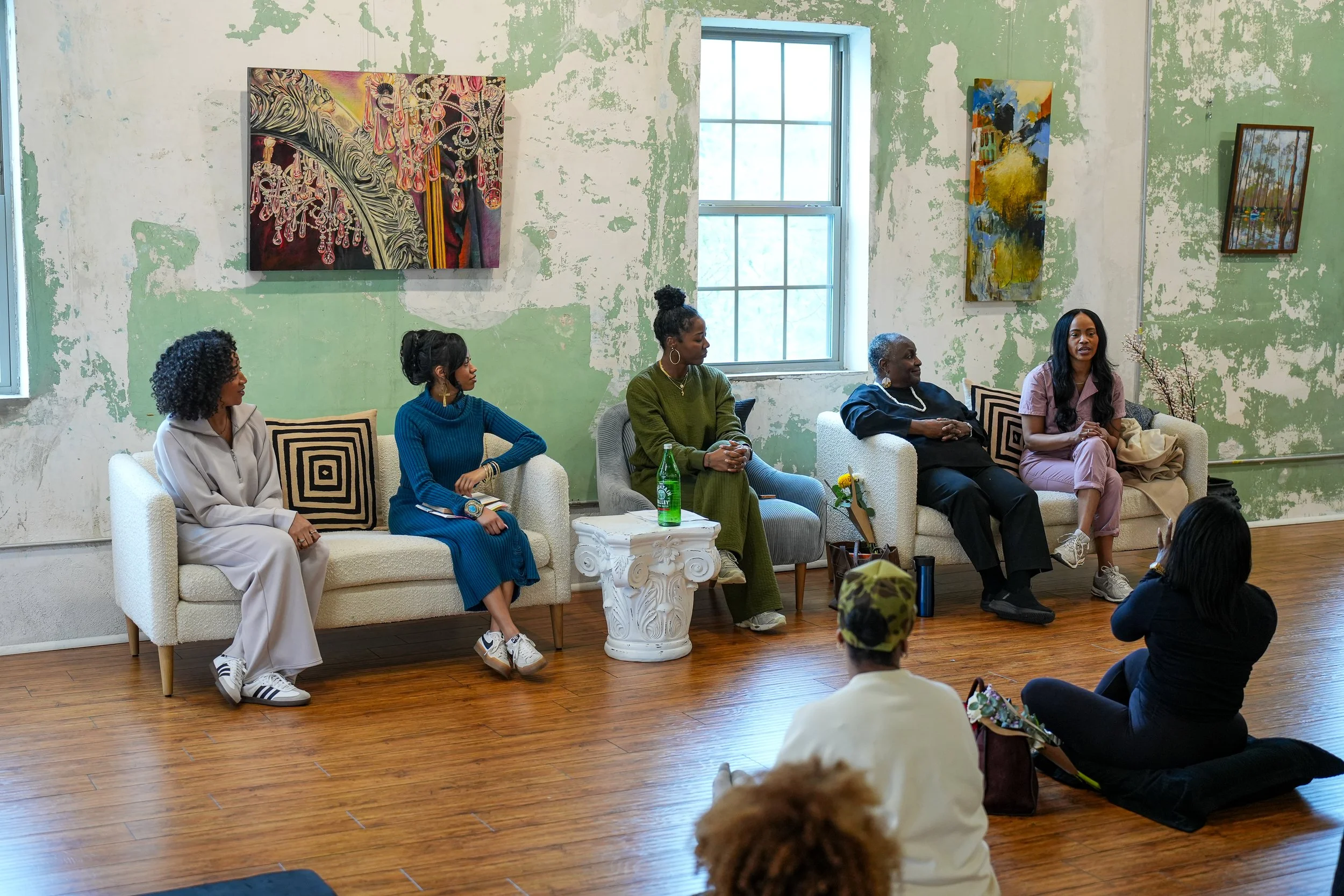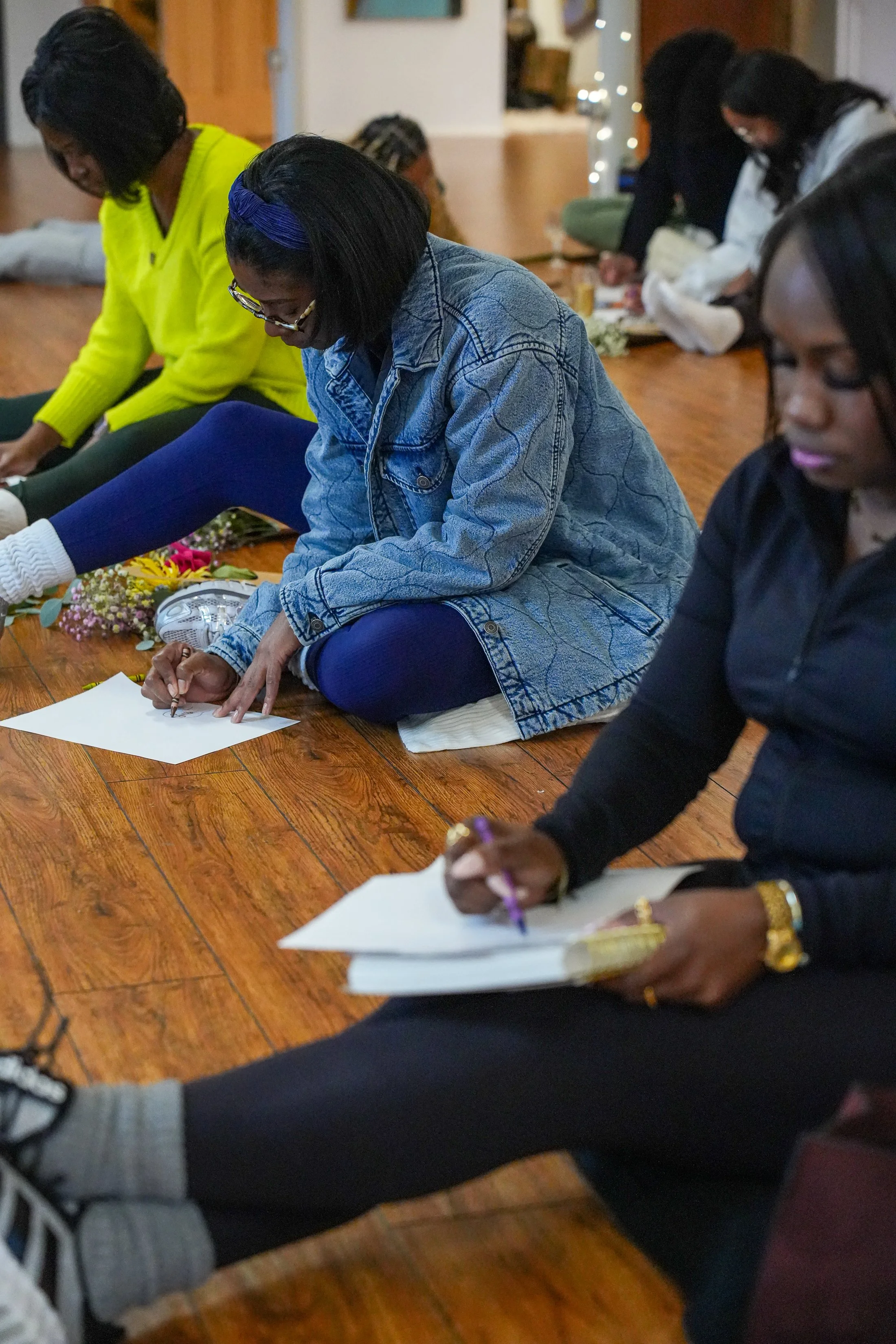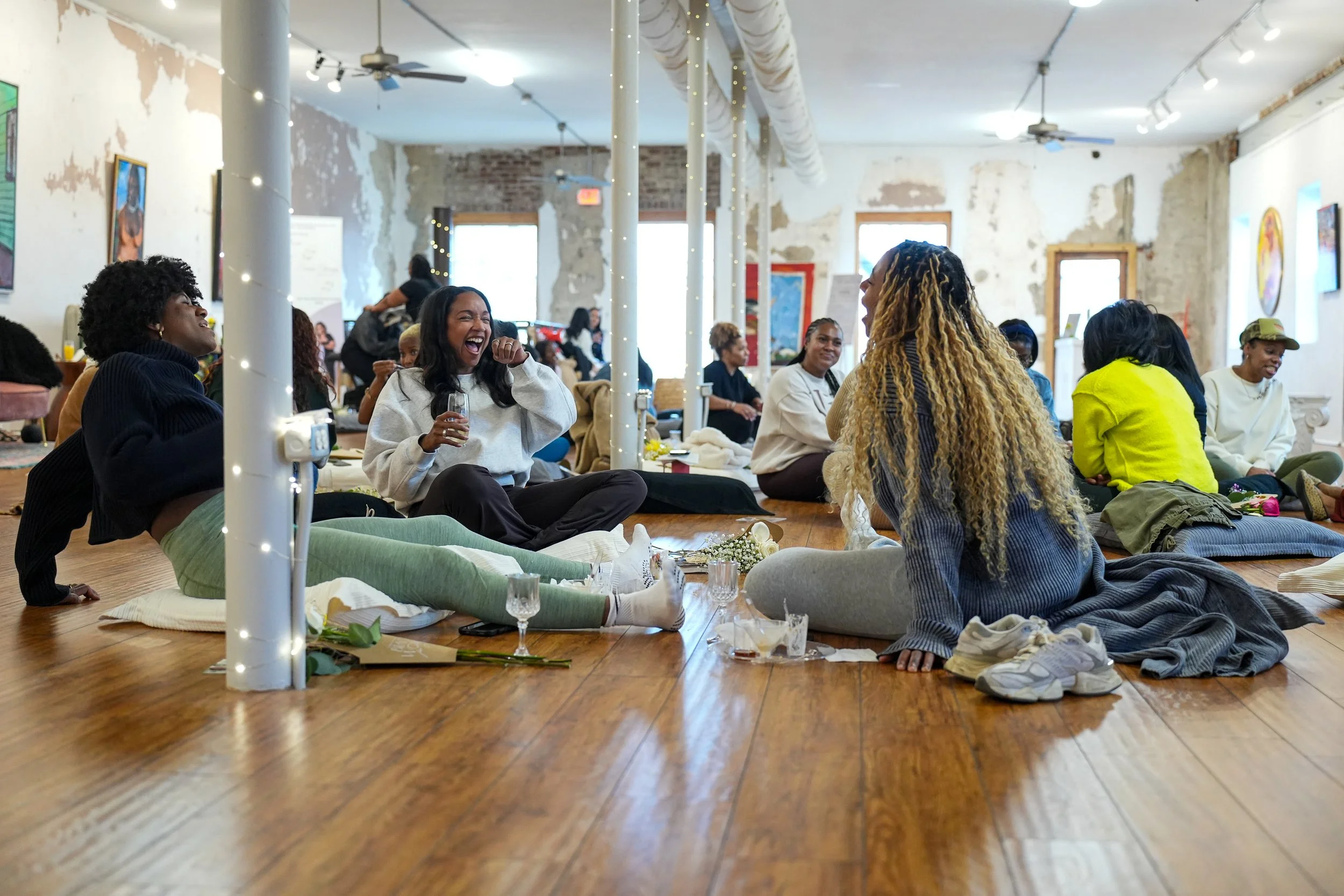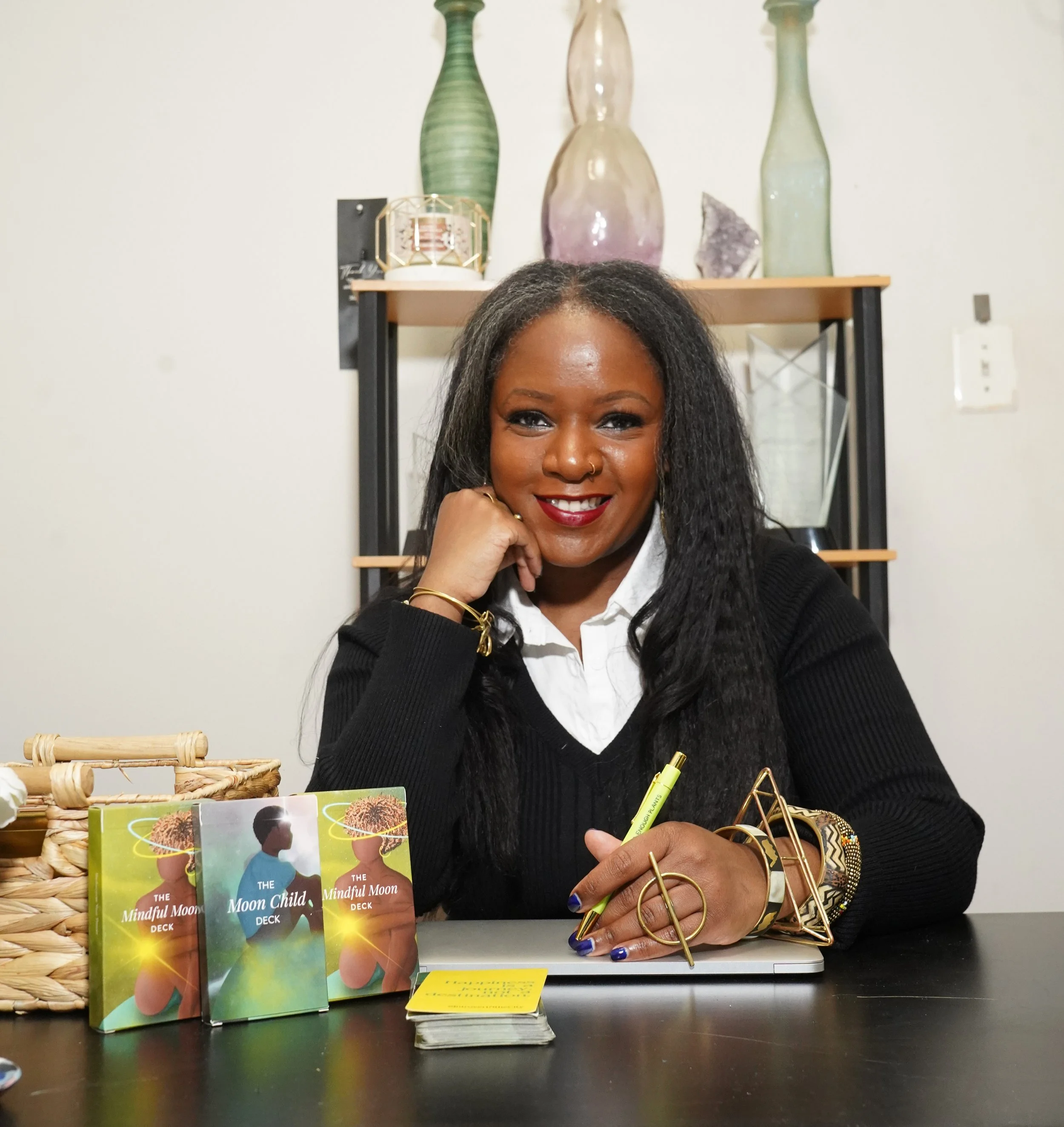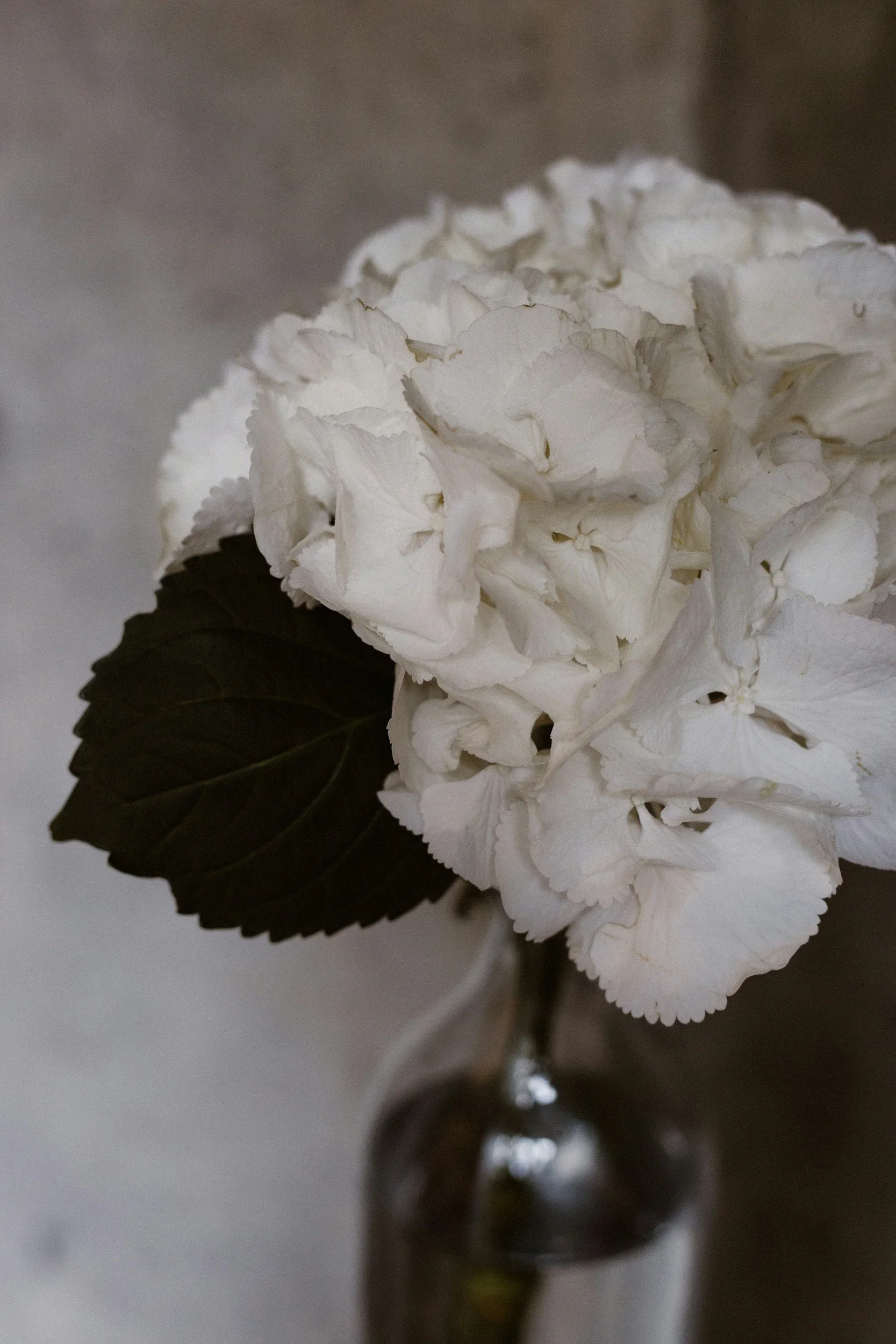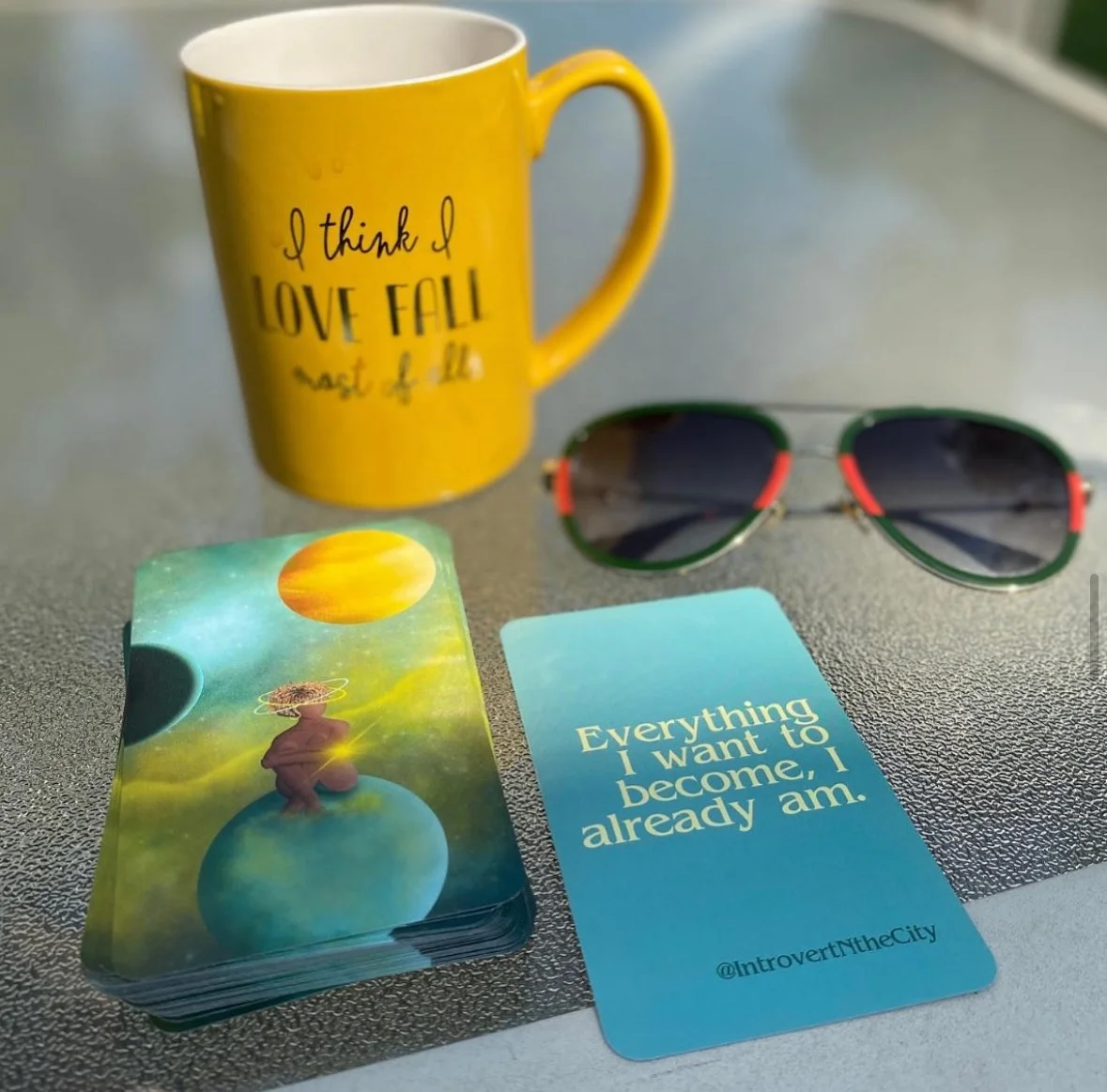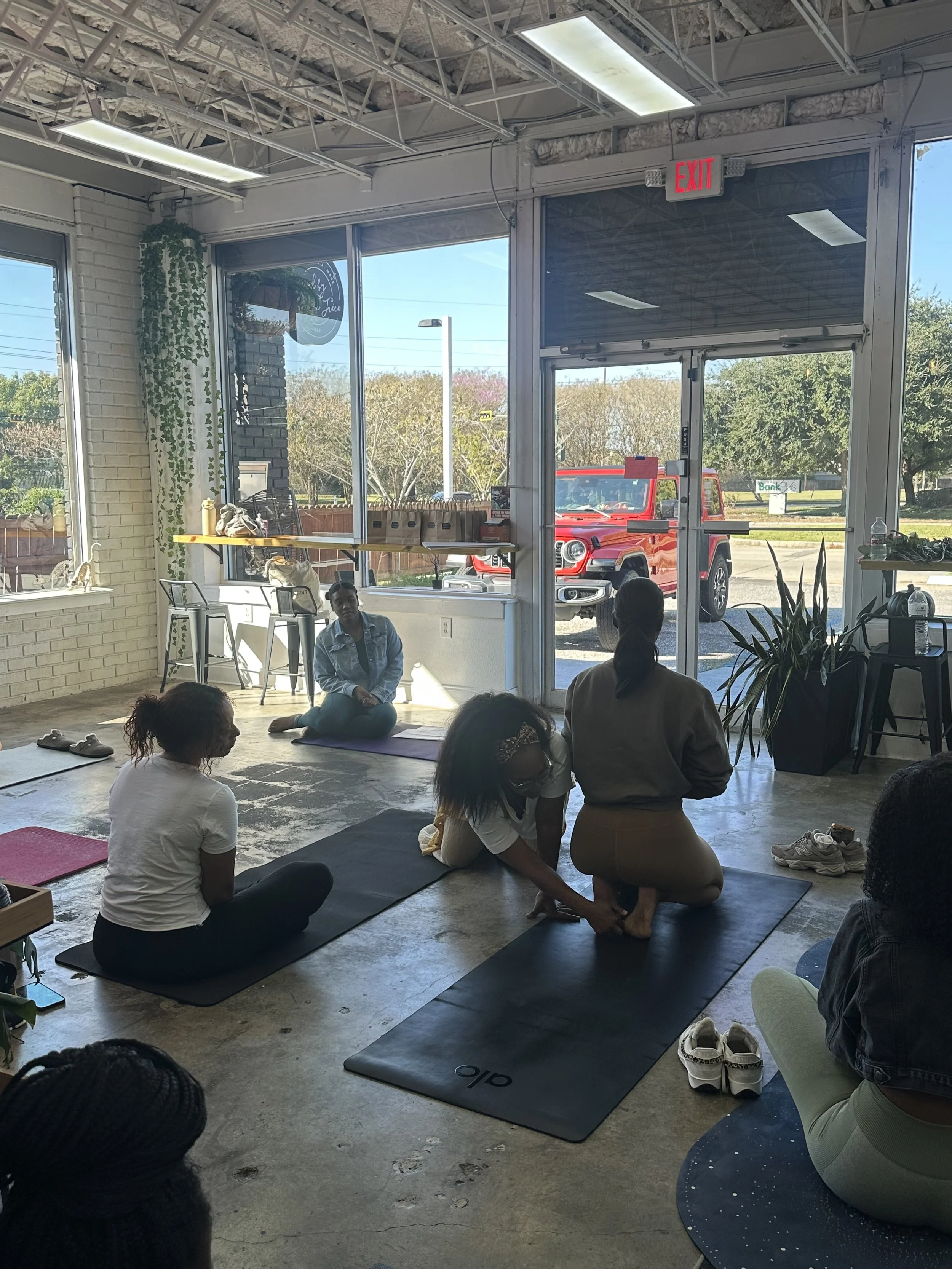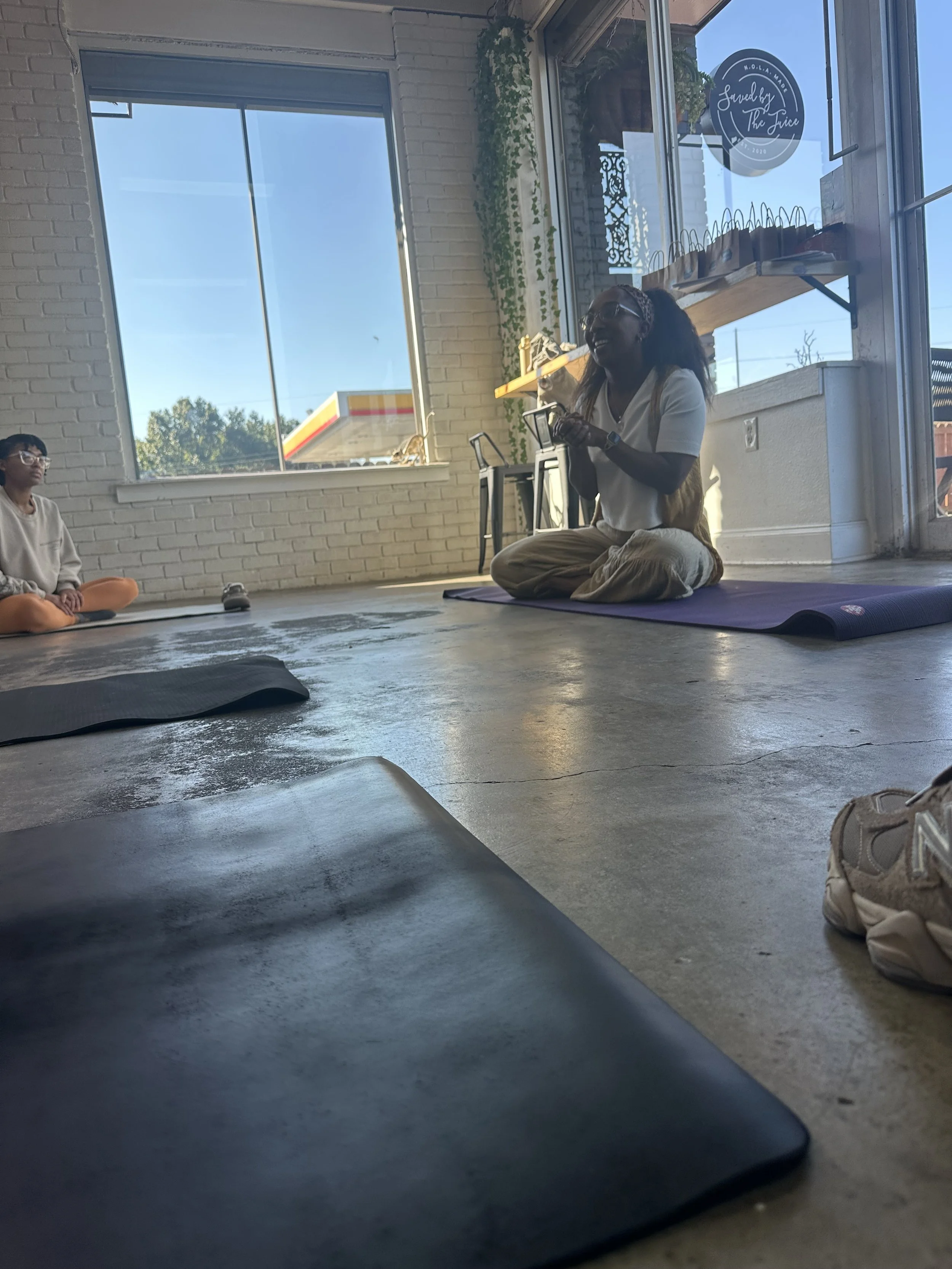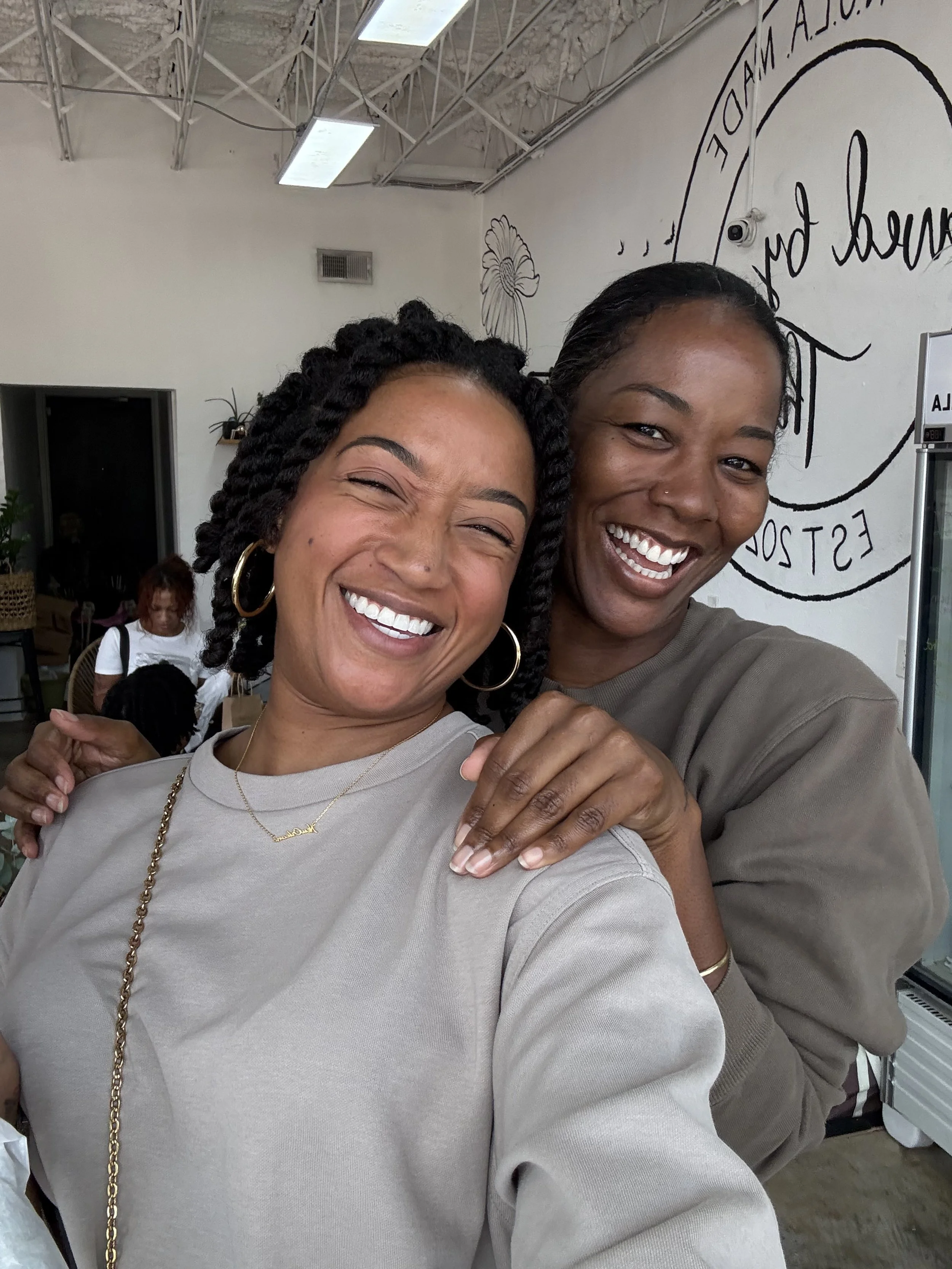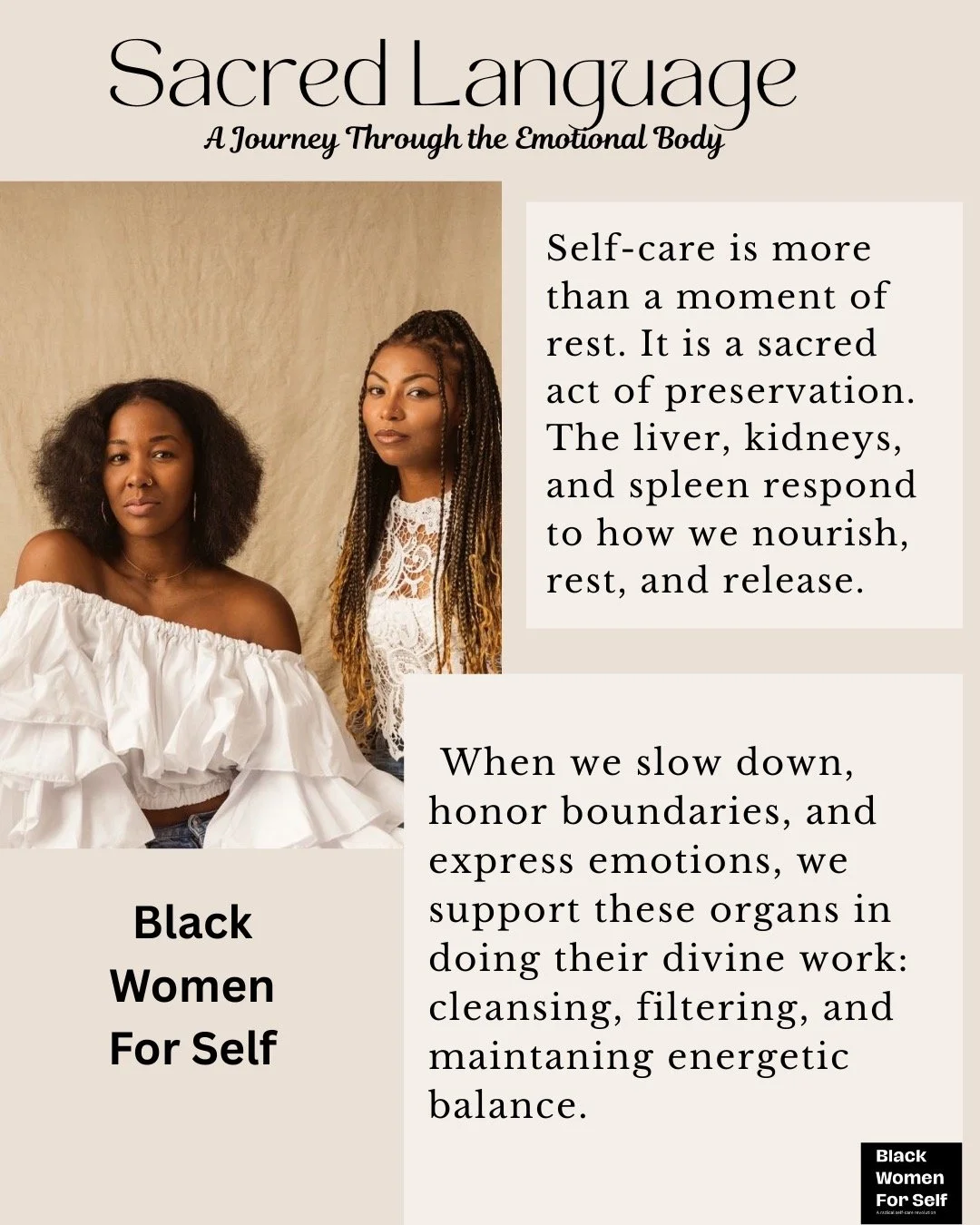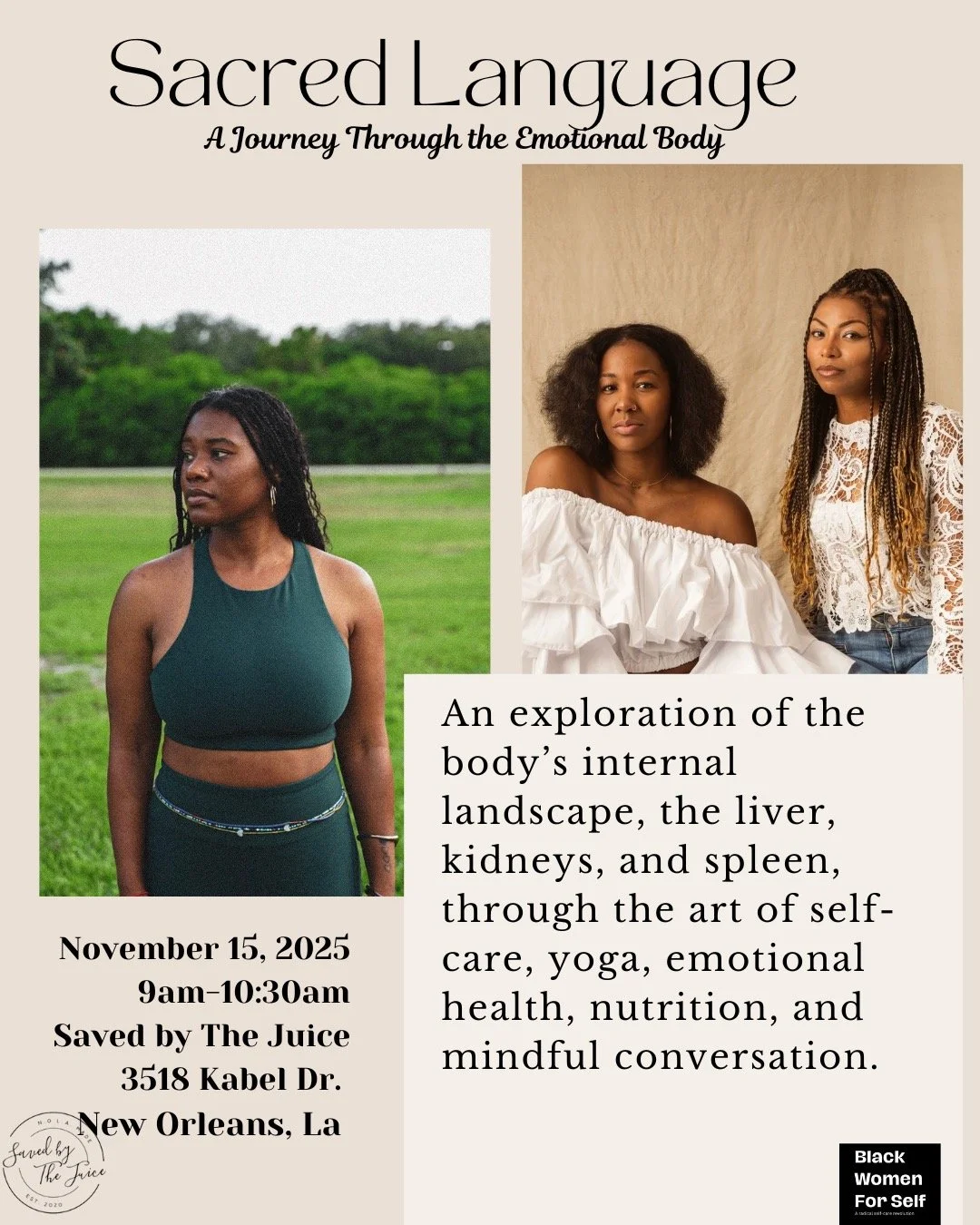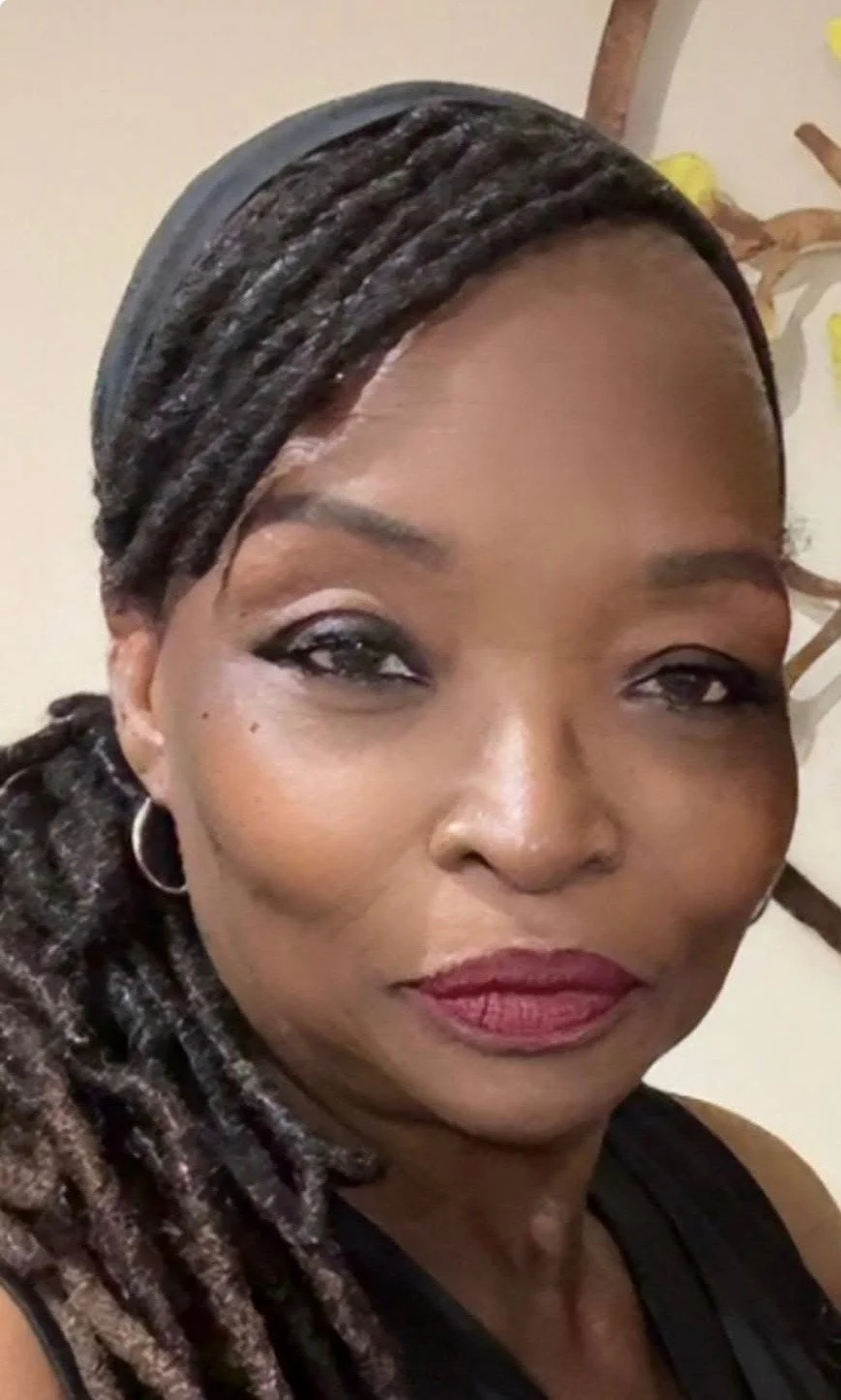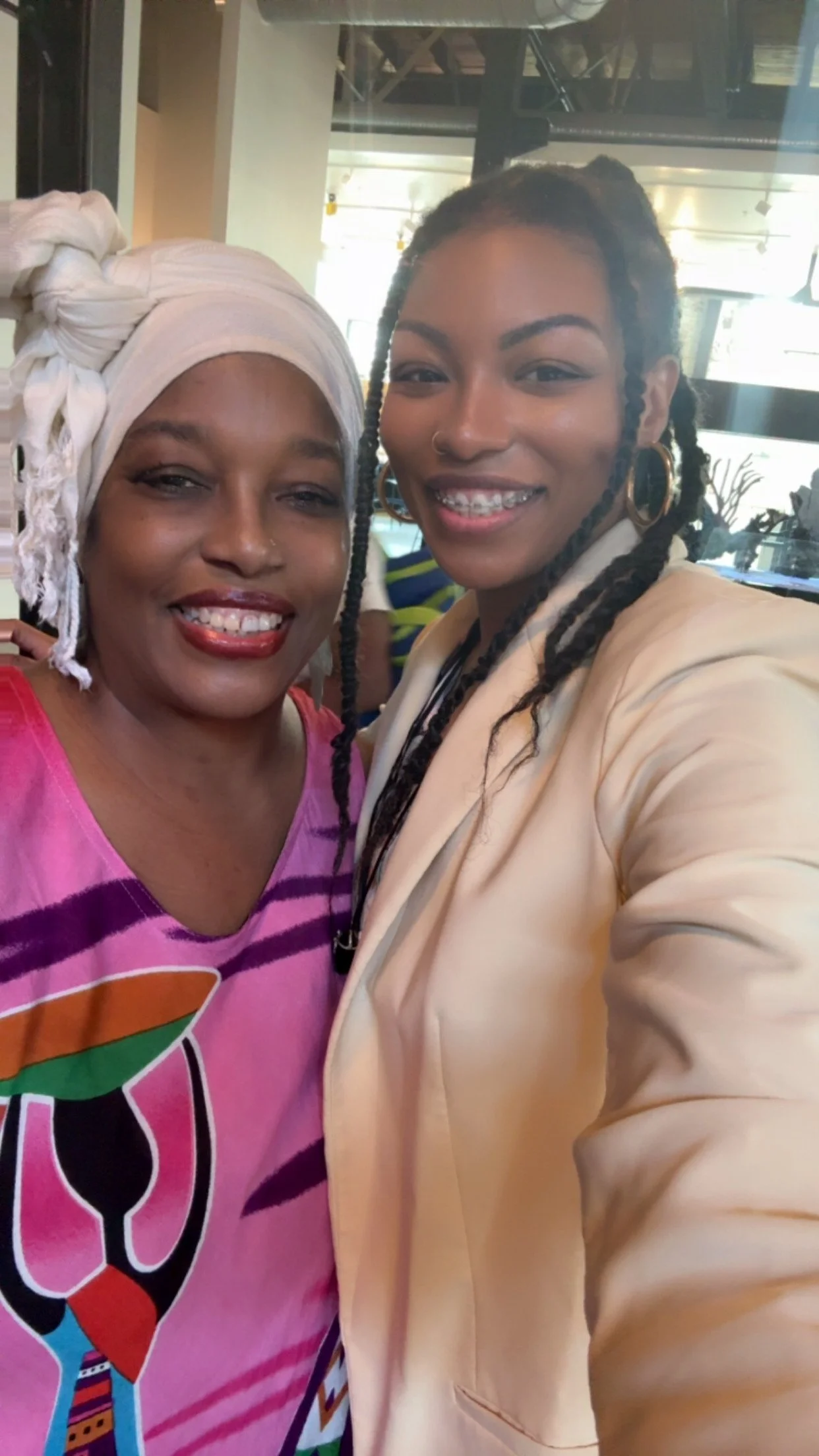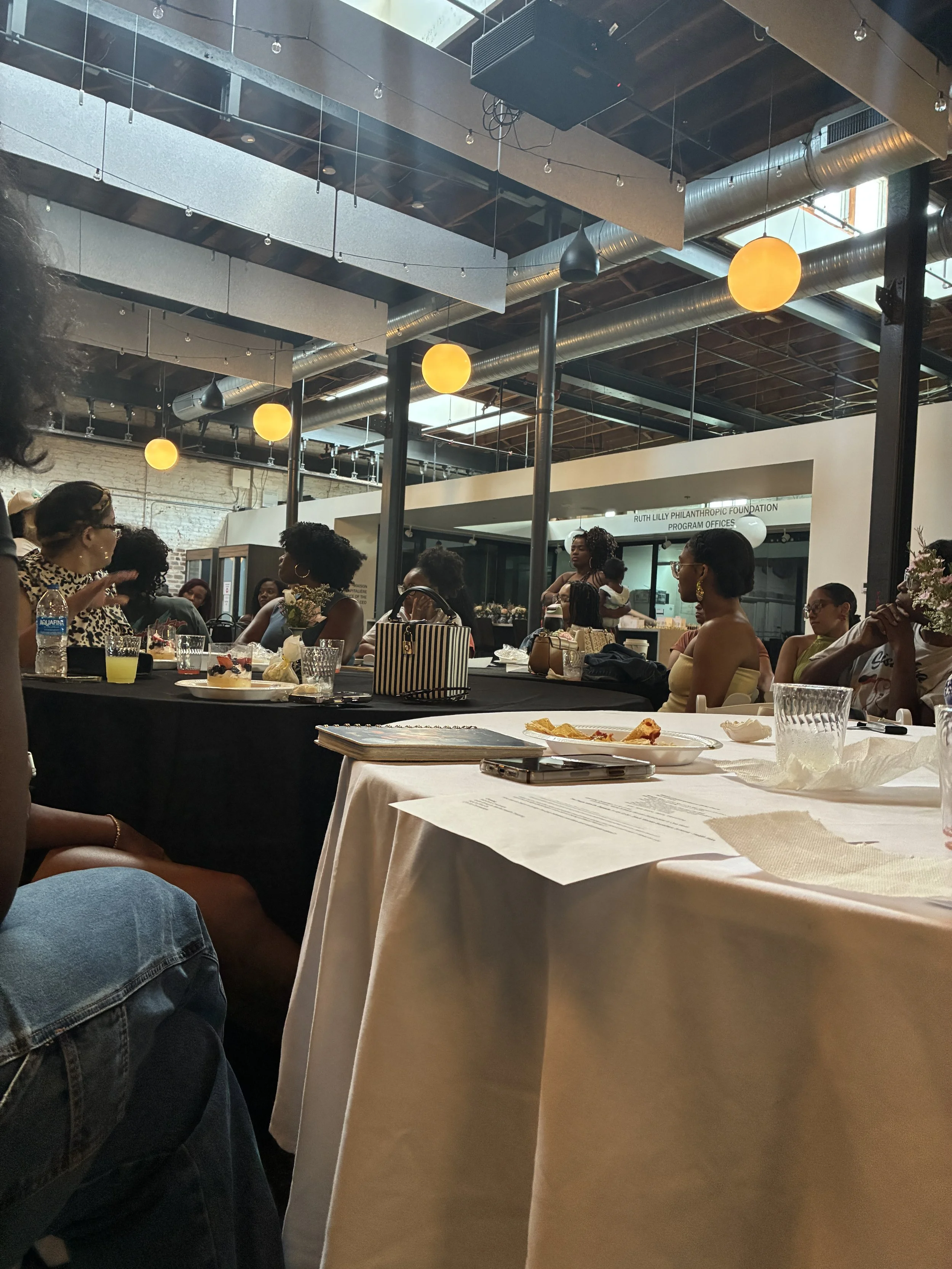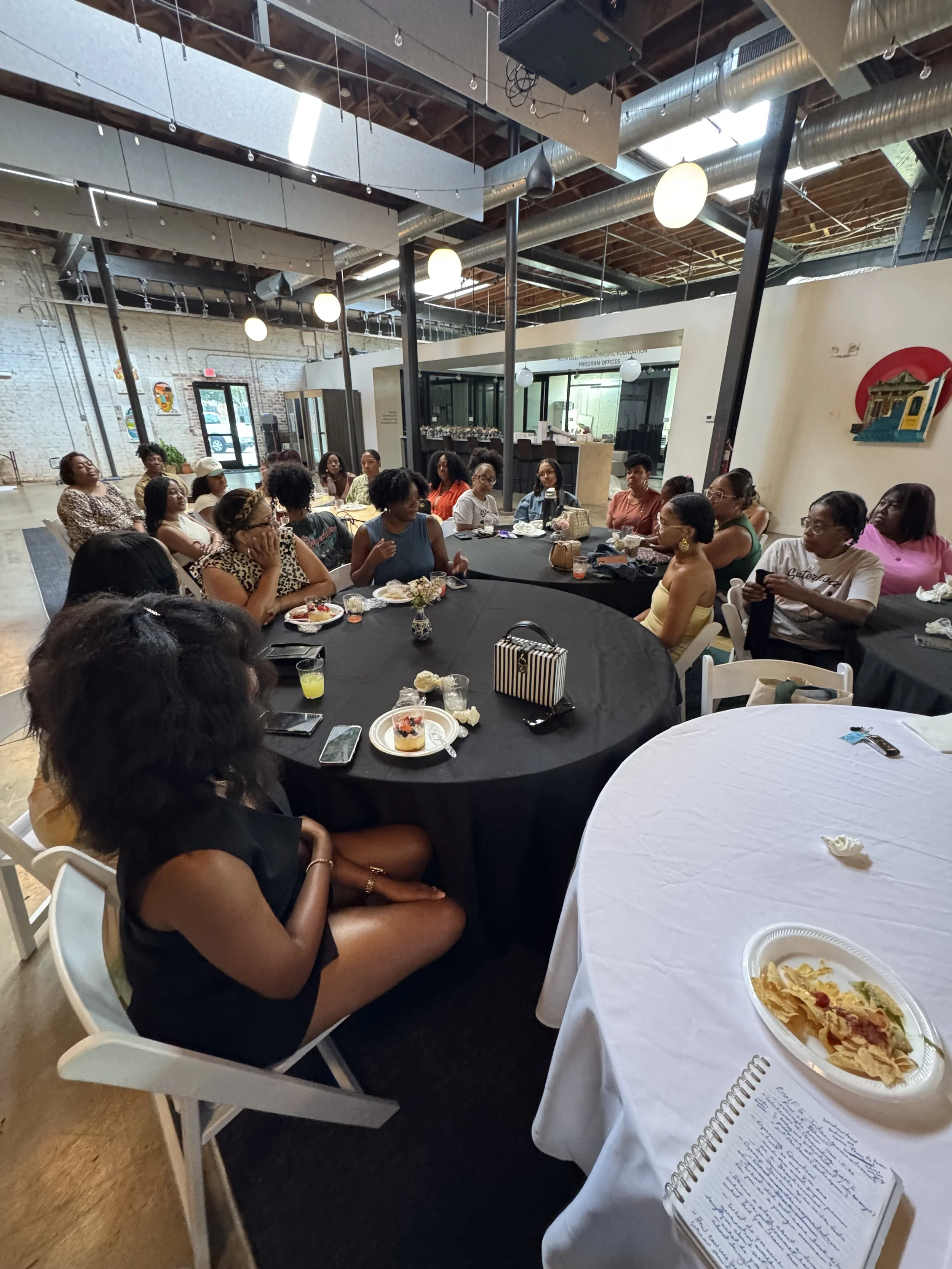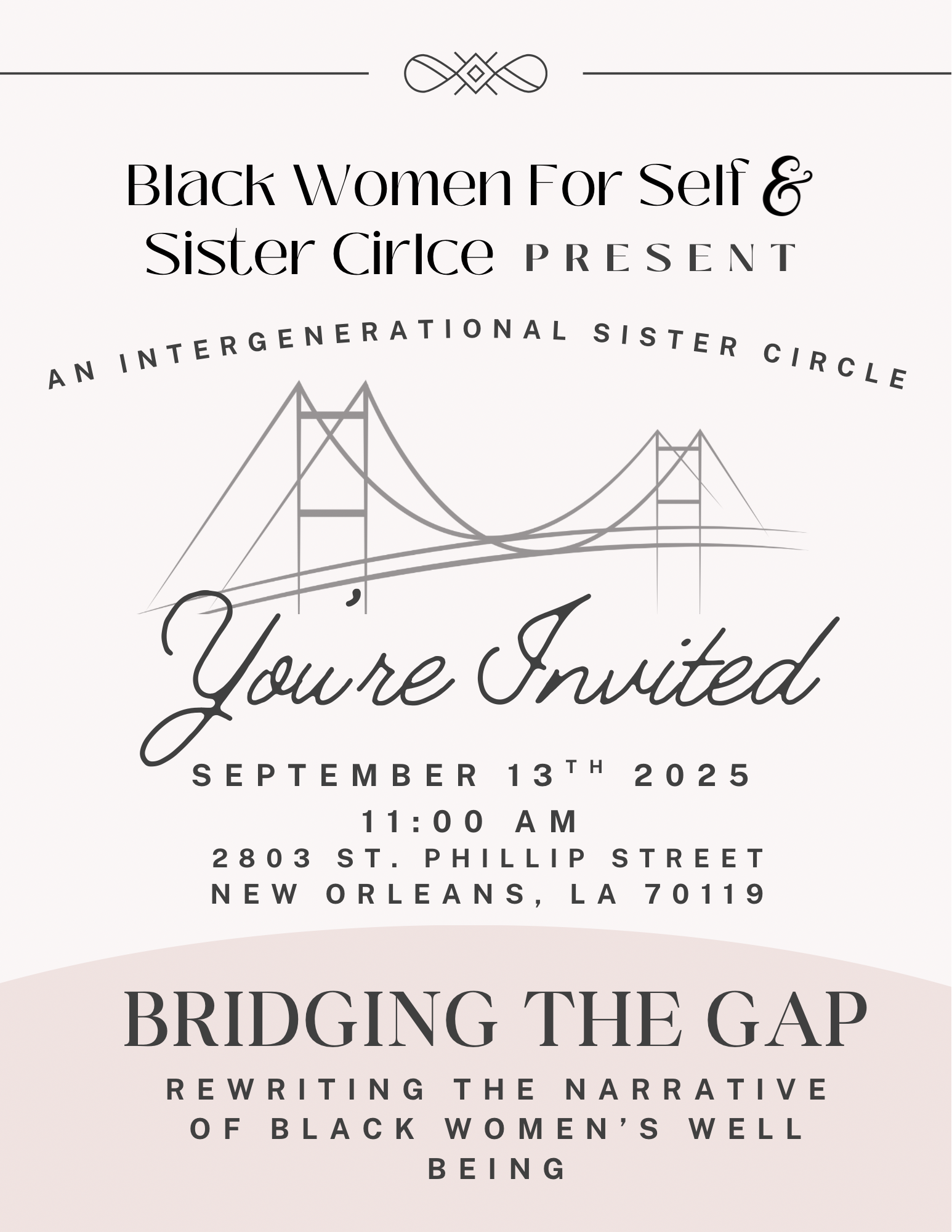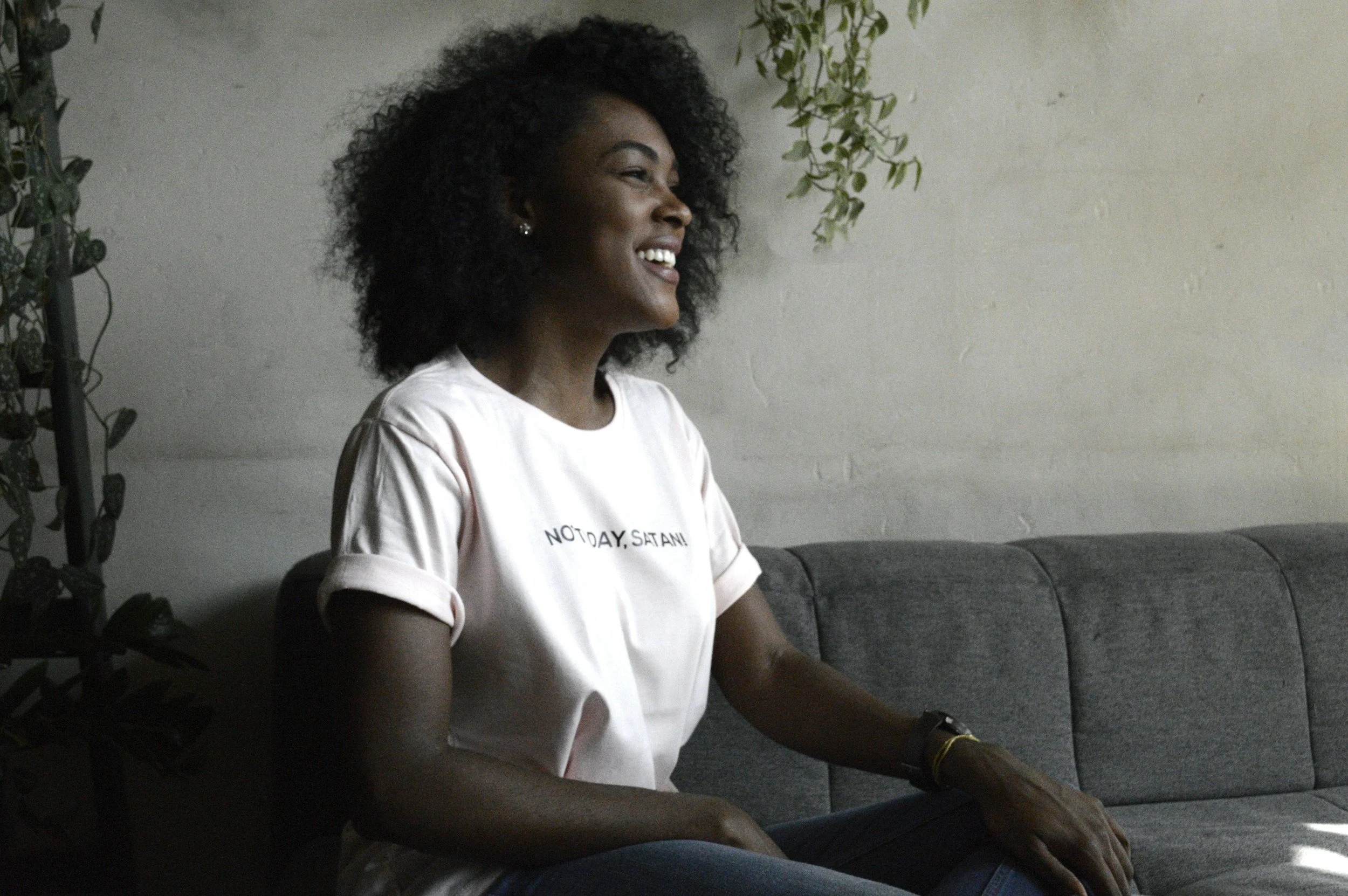We Rested. We Restored.
This past Saturday, Black Women For Self held sacred space. Our “A Day of Collective Restoration” was nothing short of an ancestral-honoring, soul-stirring gathering rooted in rest, reflection, and radical self-care.
Reflections from A Day of Collective Restoration.
This past Saturday, Black Women For Self held sacred space. Our “A Day of Collective Restoration” was nothing short of an ancestral-honoring, soul-stirring gathering rooted in rest, reflection, and radical self-care. Surrounded by some of the most dynamic Black women in New Orleans, we came together in a Black woman-owned venue with a shared intention: to explore what racial healing looks like for us and how we begin (and continue) that work with compassion, honesty, and care. BWFS encourages Black women to rest, release, and pour into us through radical self-care. Too many Black women are affected by stress-related diseases, with racism being a significant stressor. The intention for this gathering was to gently explore the biases that impact our lives in a soft, welcoming space.
From the moment guests arrived, the energy in the room was palpable. There was power in our presence. It was such a beautiful thing to see Black women choosing to pause, soften, be witnessed, and tend to themselves in community.
Throughout the day, we were guided through experiences, all curated by Black women, designed to nourish both our bodies and spirits. A grounding sound meditation by Tieara Dokes invited us to settle into stillness, allowing our nervous systems to exhale. Nova and her magical womb work created space for deep connection and remembrance, guiding us to release and honor all that we carry within our bodies. Serene Massage by Xylona blessed us with healing massages that offered moments of physical relief, reminding us that rest is not a luxury but a necessity.
At the Bloom Bar, women created beautiful floral arrangements, each one unique, expressive, and reflective of the hands that shaped them. The Tea Activation Station, by The Green Tea Collective, offered intentional blends that promoted rest and relaxation and also encouraged ritual and presence in even the smallest acts. We gathered over a delicious, thoughtfully prepared brunch by Chef Shakia, breaking bread, sharing stories, and delighting in the joy of being cared for.
An affirmation wall became a living testament to our collective truth, words of love, affirmation, and intention layered one upon another. Laughter flowed freely. Tears were shed.
At the heart of the day was a dynamic and deeply moving conversation centered on racial healing. Led by Ashlee Rene’, Dr. Danielle Wright, Cierra Chenier, and Dr. Marva Lewis, we explored the history and ongoing impact of colorism and hair bias, reflected on the impact of the Tignon Law, and named the ways these systems have shaped our self-perception and lived experiences. Through an impactful exercise led by Dr. Lewis, many of us found ourselves reconnecting with our younger selves, acknowledging what she endured and what she still deserves. Most importantly, we held space to imagine and discuss how we heal moving forward, individually and collectively, through truth-telling, self-love, and intentional community care.
We left the space changed; lighter, fuller, more connected to ourselves and one another. And even days later, we are still reeling from the beautiful energy that filled the room.
Thank you to every woman who showed up, leaned in, and chose herself. Thank you for trusting BWFS with your rest. This is only the beginning.
I would especially like to thank Dulce Events for bringing this event's vision to life. You are deeply appreciated!
Sign up for our newsletter to receive an invitation to our next event!
In Rest,
Samjah Iman
Photo Credit: Mike Carter
2025 Did The Most…Plus An Exclusive Event Invitation
If 2025 did nothing else, she did the most. Sis came into our orbits with a bit of a nasty attitude at first (and rightfully so, given all the Trump BS), then she straightened out a bit, only to act up again.
If 2025 did nothing else, she did the most. Sis came into our orbits with a bit of a nasty attitude at first (and rightfully so, given all the Trump BS), then she straightened out a bit, only to act up again. But one thing is for sure: she taught us some valuable lessons about the importance of self-care that we will surely take with us into the years ahead. She showed us that Black women are the heartbeat of the world, and to keep that heartbeat pumping, we must put ourselves first because no one else will.
We must continue to form communities around our mental, physical, spiritual, and emotional well-being. We must continue to treat ourselves with the utmost care, dignity, and respect. We must rest, delegate, do the least at times, let others handle things, and say goodbye to those who don’t get our greatness.
We are the shit, and it’s time we start treating ourselves as such and stop waiting for permission or validation from others. With that being written, may our 2026 be filled with “we are the shit” mindsets and actions. May our boundaries be plentiful and our people-pleasing ways non-existent. May we bask in our fully rested, healthy aura and achieve all the self-care goals we set out to achieve.
And hopefully, you’ll add our “A Day of Restoration” exclusive event, happening January 24th, to your list of self-care goals for the new year (trust me, you will want to be part of this soulful activation). There are only a few spots available. Click here to reserve yours.
Until then, keep up the good self-care work. Black women have ignited a revolution, and words can’t express how proud I am of us.
Hope to see you at the event in 2026!
- Samjah Iman
And if I asked you to name all the things you love, how long would it take for you to name yourself?
The first time I heard that question, I was convinced I'd name myself first. I knew I loved myself, but years of unresolved trauma and people-pleasing behaviors gently challenged my response.
The first time I heard that question, I was convinced I'd name myself first. I knew I loved myself, but years of unresolved trauma and people-pleasing behaviors gently challenged my response. I grew up in an era where "children are to be seen and not heard" was the household motto. My very traditional West Indian mother taught me responsibility, which created the hyper-independent armor I'm still dismantling today.
On top of taking on more responsibilities than a typical child should, I overperformed to gain validation. No matter how smart or talented I was, my mother wasn't easily impressed. Not because she wasn't proud, but because doing well was expected. Her mother never validated her, so she didn't naturally know how.
It took years of therapy to fully understand how my upbringing shaped my adult behaviors. Doing everything on my own while showing up for others had been deeply ingrained in my psyche. Then I learned about self-preservation. For a long time, I thought I knew what that meant: my bills were paid, I had a roof over my head, and I never went without food. That was the bare minimum. True self-preservation goes beyond survival; it's about protecting your energy, your priorities, and your sense of self.
For most of my adult life, I ensured everyone around me had everything they needed to thrive. If it meant taking the back seat, I did it with a smile and called it community. What I didn't realize was that years of people-pleasing, shrinking, and compromising my worth kept me permanently in the back seat.
At 40, I began dismantling the ideology that other people's happiness mattered more than mine. Up until then, I said yes to things I didn't want to do to keep the peace. I attended events I didn't care for. I agreed to tasks I didn't have the capacity for, all to be a "team player." I was exhausted from constantly prioritizing everyone else over myself. If I truly loved myself, why did I let everyone else's needs outweigh my own?
Reflecting on these patterns forced me to evaluate what self-love really meant. I looked at how I went above and beyond for others, only to have my efforts taken for granted. At the time, it didn't bother me. I wasn't doing it for validation. But over time, pouring into cups that wouldn't pour back slowly chipped away at my self-worth.
Learning to set boundaries, honor my energy, and prioritize my own needs has been transformative. Self-preservation isn’t selfish; it’s a radical act of self-respect and a prerequisite for showing up fully in the world. The saying, “You can’t pour from an empty cup,” is often overused but rarely honored. Prioritizing yourself before anyone else can initially bring grief or guilt. But the moment you choose to honor yourself unapologetically, you set yourself free from other people’s expectations. You can’t be a good mother, wife, friend, cousin, or colleague if your mind, body, and spirit feel depleted.
Now, when I hear the question, “If I asked you to name all the things you love, how long would it take for you to name yourself?” I confidently call my own name, grounded in a firm understanding of self-preservation.
Say this to yourself:
Because I love myself, I take time to fill my cup. I say no unapologetically and compromise only within reason. I am my first priority, and that allows me to give from a place of overflow, not depletion.
This holiday season, Black Women for Self subscribers can enjoy a special discount on the Mindful Moon Deck, Moon Child Deck, and Love Notes Deck with the code BlackWomen4Self—valid through November and December. These affirmation decks are powerful self-development tools for kids and adults, perfect for building confidence, reflecting inward, and fostering emotional growth. Plus, a portion of proceeds supports the Black Women for Self organization, making it a gift that truly gives back. Just in time for the holidays, these decks are a meaningful way to nurture yourself or someone you love.
Purchase your decks here.
- Marsha B
Marsha Badger, award-winning journalist and creator of the Mindful Moon Deck and Moon Child Deck, knows that growth isn’t always comfortable. In this post, she shares how trusting her intuition helped her navigate career shifts, setbacks, and new opportunities, proving that the guidance you seek has always been within you.
I Need This Grief Event, And So Do You…
In April this year, I partnered up with family to open my dream business - a cafe. In May, my dearest grandmother transitioned. I put my best Black woman cape on and handled it all. But now, I’m exhausted, and there’s no running from it.
In April this year, I partnered up with family to open my dream business - a cafe. In May, my dearest grandmother transitioned. I put my best Black woman cape on and handled it all. But now, I’m exhausted, and there’s no running from it. This year has stretched me in ways I didn’t know were possible, and now I’m feeling emotionally sore. I need a moment. Although I’ve been intentional about practicing radical self-care (thanks to BWFS for holding me accountable), I still have some aspects of self-care to work on - and one of those aspects is understanding, recognizing, and coping with grief.
BWFS was started to encourage Black women to prioritize themselves. Our upcoming event is set for us to do just that. It’s our annual Navigating Holiday Grief Sister Circle, and I have a feeling we all need this event. Black women tend to hold our heavy emotions in our bodies, which can fester and eventually turn into dis-ease. So, before we get into a slump or possibly crash out on someone, let’s gather together before this year is out to regurgitate some of the heaviness we’ve been holding on to.
You never know what you’re carrying until you’re given the space to put some shit down….and this is just what this next event is for - putting some shit down.
Click here to join us in releasing. See you in the sister circle.
- Samjah Iman
Everything I Want to Become, I Already Am
It felt like the first day of school when I started my job as a fashion and beauty editor. I'd been writing for most of my life, but this was the first time I felt at home in my career. I was finally doing something I loved.
Marsha Badger, award-winning journalist and creator of the Mindful Moon Deck and Moon Child Deck, knows that growth isn’t always comfortable. In this post, she shares how trusting her intuition helped her navigate career shifts, setbacks, and new opportunities, proving that the guidance you seek has always been within you.
It felt like the first day of school when I started my job as a fashion and beauty editor. I'd been writing for most of my life, but this was the first time I felt at home in my career. I was finally doing something I loved.
My imposter syndrome told me I had no idea what I was doing. And while I had huge shoes to fill, I was ready for the challenge. I slipped my size 8 feet into a pair of Shaquille O'Neal-sized sneakers and got to work. I flopped around in those kicks for a couple of months until I found my footing. Ambition had me asking for a promotion just one year in, and because the publication recognized my value, they offered me the Senior Editor position.
Over the years, my feet grew larger, and I was a bunion away from outgrowing these shoes. It was time for a change. I advocated for another promotion but faced opposition. Job applications stalled at the second or third interview, prompting me to focus my energy on my affirmation decks: creating a business plan, forming an LLC, obtaining a Department of Labor vendor license, and developing a social-emotional learning curriculum for students. I did all this while working full-time, including over 20 hours of overtime. Exhausted, I still staggered along in shoes that were barely holding together.
I wanted to quit, but I believed in having a life vest before diving headfirst into our volatile economy. With no job prospects, I stayed in a place that hindered my personal and professional growth.
Then one Friday, a meeting appeared on my calendar for Monday. I asked what it was about, but I was told to wait. That morning, my intuition whispered, "You're about to get laid off." Thirty minutes later, I was reviewing my severance package.
And just like that, my old shoes were gone. The Universe gave me a new pair that felt wildly uncomfortable. They were different. Some paths I walked with ease, then BAM! A brick wall. Disorienting, yes, but my intuition helped me recalibrate. I'd adjust, find my footing, and then hit another wall.
Unbeknownst to me, these new shoes were paving my own lane. Each wall forced me to rely on my intuition to forge a way forward. I hit more brick walls than I could imagine, but no matter how lost or discouraged I felt, my inner knowing would reroute me. Every action laid a brick, and each detour taught me something essential about myself. I had to unlearn the survival instincts that knocked me off track; the mindset I once relied on was ill-equipped for this road. Outgrowing the shoes that guided me through that season meant shedding behaviors that kept me looping in old patterns. The Universe—or your higher power—equips us with the perfect shoes for each season. When it's time to leave one road, we step into a new pair. All we have to do is trust that the new pair already knows the way—they even know what baggage we need to leave behind to make the journey seamless.
Shoes protect our feet and guide us through the world. Think of them as your intuition: helping you evolve, keeping you safe, and maintaining alignment. Each roadblock gently redirects you to listen to your inner voice.
I've settled into my shoes for this season, and while the discomfort remains, they've helped me realize that everything I want to become already exists inside me. All I have to do is trust myself. I don't always know the destination, but as long as I follow my inner compass, I have everything I need to get there.
This holiday season, Black Women For Self subscribers can enjoy a special discount on the Mindful Moon Deck, Moon Child Deck, and Love Notes Deck with the code BlackWomen4Self—valid through the remainder of November and all of December. These affirmation decks are powerful self-development tools for kids and adults, perfect for building confidence, reflecting inward, and fostering emotional growth. Plus, a portion of proceeds supports the Black Women For Self organization, making it a gift that truly gives back. Just in time for the holidays, these decks are a meaningful way to nurture yourself or someone you love.
Click here to get your deck!
- Marsha B
Sacred Language Recap: A Space for Release, Restoration & Radical Self-Care
This weekend, Black Women For Self gathered in community for our Sacred Language: Journey Through the Emotional Body event, and the experience was nothing short of grounding, powerful, and deeply needed.
This weekend, Black Women For Self gathered in community for our Sacred Language: Journey Through the Emotional Body event, and the experience was nothing short of grounding, powerful, and deeply needed.
Hosted at Saved By The Juice, a Black woman–owned juice bar that radiates nourishment and intention, the space held us beautifully as we reconnected with our bodies and returned to ourselves.
We began with a gentle, eye-opening conversation on acupressure, exploring how simple points on the body can help relieve stress, support emotional balance, and provide quick grounding tools that we can use every day. The conversation was a reminder that healing doesn’t always require big steps; sometimes it’s the smallest touch that brings us back to our center.
From there, we flowed into yoga, moving through poses designed to help release what we’ve been holding mentally, emotionally, and physically. As we breathed together, the room softened, shoulders dropped, and hearts opened. Our bodies spoke, and this time we actually listened.
We closed the day with a warm, self-care-filled fireside chat, sharing stories, reflections, and truths that Black women often carry alone. It was a moment of true sisterhood that also served as medicine.
Sacred Language was a community, a means of education, a catalyst for movement, and a release. It was a space where Black women could show up fully, be held gently, and leave feeling a little lighter.
Thank you to Jasmine and Tieara for leading this event, and thank you to every woman who attended, shared, stretched, and breathed with us. Also, thank you to Saved By The Juice for offering us a home for this healing work.
Here’s to more moments like this where our bodies lead, our spirits rest, and our self-care becomes sacred again.
- Samjah Iman
Your Body Remembers (Our Next Event)
Our bodies are sacred archives, holding every emotion, every memory, and every piece of wisdom our spirits have gathered along the way. For Black women, this truth runs even deeper.
Our bodies are sacred archives, holding every emotion, every memory, and every piece of wisdom our spirits have gathered along the way. For Black women, this truth runs even deeper. We carry not only our own stories, but generations of strength, survival, and silence. And that’s a lot, y’all.
At BWFS, we believe radical self-care begins with listening; not just to our thoughts, but to the quiet messages living within our bodies. Our liver can hold anger we never voiced. Our kidneys can carry fear we’ve learned to swallow. Our spleen can store the weight of worry we forgot to name.
Our next FREE event, in collaboration with yogi Jasmine Nicole, “Sacred Language: A Journey Through the Emotional Body” invites us to explore this inner landscape together. Through yoga, mindful conversation, and holistic self-care, we’ll reconnect with our bodies as teachers, not battlegrounds.
This is a space for softness, truth, and release. A space to remember that our healing is our birthright, and our bodies already know the way.
We hope that you will take this time out for yourself, in the name of radical self-care. See you soon?
- Samjah Iman
Event Details:
Join us for Sacred Language: A Journey Through the Emotional Body, where we explore how the liver, kidneys, and spleen mirror our inner world. Through yoga, mindful conversation, and holistic self-care, we’ll discover what it means to listen and care for ourselves — beyond the surface truly.
When: November 15th
Where:3518 Kabel Dr. New Orleans
Time: 9:00 am - 10:30 am
Click here to claim your spot.
A New Beginning: My Journey as a Breast Cancer Survivor
From the desk of the Vice President of the Black Women For Self organization - a breast cancer survivor story rooted in love, triumph, and lessons in honor of National Breast Cancer Awareness Month.
From the desk of the Vice President of the Black Women For Self organization - a breast cancer survivor story rooted in love, triumph, and lessons in honor of National Breast Cancer Awareness Month.
My name is Debbie Scott, and in 2017, my life changed forever when I was diagnosed with breast cancer in my right breast. The cause, I believe, was my constant habit of resting my cell phone against it. In 2018, I underwent a six-hour surgery that removed not only the cancer but also all of the lymph nodes under my right arm. During that same surgery, an implant was placed in my right breast and a reduction was done on my left breast.
“This experience has taught me to take a long, hard look in the mirror. At this point in my life, I chose me. ”
I remember telling God that He truly had a sense of humor—because by His grace and mercy, I was able to receive this life-saving surgery completely free. Thanks to my good health at the time, I didn’t need chemotherapy or radiation therapy. Instead, I was prescribed a preventative drug called Tamoxifen, which I took faithfully for five years. While the treatment journey wasn’t as harsh as it could have been, the emotional and spiritual lessons I learned along the way were life-changing.
One of the blessings that came out of this experience was the privilege of encouraging and counseling young women who were terminally ill. I shared with them what I knew to be true—that God Almighty is a healer, that prayer changes things, and that giving up is never the answer. At 66 years old now, I look back on that chapter of my life with deep gratitude. I not only survived, but I discovered more about who I am, who I was meant to be, and what God was preparing me for. Before my diagnosis, I had struggled with very large breasts that caused back pain and forced me to spend money on expensive bras just to find some relief. I knew I needed a reduction, but without medical insurance, it felt impossible. Yet once again, God opened a door. I was able to receive Medicaid benefits that covered the surgery which ultimately saved my life.
I’ll never forget April 24, 2018—my 59th birthday. That was the day of my surgery. When I received the call confirming it would be scheduled for that day, I cried from the shock. But my daughter Chaila, with her wisdom and strength, looked me in the eyes and said: “Mama, think of this as your new beginning.” Those words carried me through. And she was right—it was a new beginning.
Today, I proudly say that I am a seven-year breast cancer survivor. My story is one of faith, family, and resilience. It is proof that God’s grace makes the impossible possible. This experience has taught me to take a long, hard look in the mirror. At this point in my life, I chose me. I stopped caring about or worrying about what others thought about a decision I made to improve my quality of life. For the first time in a long time, I’m loving myself and living my best life full of happiness and unspeakable joy. Chaila, Jamaal, and Jackson were my reasons to fight for the woman that I’ve become. And most of all, it is a reminder that no matter how hard the journey gets, there is always a reason to keep going.
Debbie Scott,
Vice President
Black Women For Self
Recap: Bridging the Gap – An Intergenerational Conversation on Self-Care
This past Saturday, Black Women For Self hosted a powerful gathering that brought together Black women across generations for an honest conversation about wellness, sacrifice, and the importance of radical self-care. What unfolded was more than dialogue, it was healing.
This past Saturday, Black Women For Self hosted a powerful gathering that brought together Black women across generations for an honest conversation about wellness, sacrifice, and the importance of radical self-care. What unfolded was more than dialogue, it was healing.
We began by reflecting on the superpowers of Black women—our resilience, creativity, and the way we turn struggle into strength. But we also questioned the cost, under the leadership of Black woman therapist Dr. Danielle Wright, of constantly being “superwomen,” and what it means to lay that cape down.
We then explored societal expectations, the ways Black women have been told always to be strong, always give, and rarely rest. Our elders shared what self-care looked like in their younger years, if it was even called that at all. For many, it was simply surviving, keeping the family together, working multiple jobs, or pushing through pain without complaint.
One moving theme was the exchange of wisdom between generations. Younger women shared what they wished older women had told them about self-care: that rest is not weakness, that boundaries are protection, and that joy is essential. In turn, the older women shared what they wish younger Black women knew about being a Black woman: that the fight for dignity and survival has always been heavy, but also that there is pride, beauty, and community in our journey
There were tears, laughter, and truly cathartic moments as we realized how much we carry, and how much lighter we can become when we share the load together.
At Black Women For Self, we know conversations like these are not just events, they’re acts of resistance. They remind us that self-care is not selfish, but life-saving.
As we continue this work, we invite you to join us in our Self-Care September Challenge. Let’s put these lessons into practice and build a new legacy of wellness for Black women. Click here to opt in.
Also, if you’re interested in joining us in a Mental Health First Aid training, see below.
We are pleased to invite you to the next MHFA course:
📅 Date: Tuesday, September 23, 2025
🕘 Time: 9:00 AM – 3:00 PM
📍 Location: J. Wayne Leonard Prosperity Center, 2401 Canal Street
Please note:
· The course includes two hours of required pre-work that must be completed prior to attending.
· The in-person session lasts six hours.
To register, click here. Add Black Women For Self when asked about the organization you are affiliated with.
In Self-care,
- Samjah Iman
It’s Time To Have The Talk
When young people talk to old people, it will make us better people all around. - India Arie
When young people talk to old people, it will make us better people all around. - India Arie
It’s time to have the conversation. For generations, Black women have been taught (sometimes directly, sometimes silently) that we must put ourselves last. Our mothers, grandmothers, and great-grandmothers carried entire families, communities, and even movements on their backs, often with little space to pause, rest, or nurture themselves. The cost has been heavy because today, Black women face some of the highest rates of stress-related illnesses in the country.
At Black Women For Self, we believe that breaking this cycle starts with radical self-care. And part of that care is conversation that consists of open, honest, healing dialogue between generations of Black women. Because the truth is, we can’t rewrite our future without first understanding the lessons of our past.
That’s why our next event, Bridging the Gap: Rewriting the Narrative of Black Women’s Well Being, will bring together Black women across generations for a powerful discussion on wellness, rest, and redefining what it truly means to care for ourselves. We’ll listen to the wisdom of our elders, share our own struggles and triumphs, and begin to build a new narrative of Black women’s well-being, one rooted in joy, wholeness, and self-preservation.
This gathering isn’t just a conversation; it’s an act of resistance. It’s a declaration that our health matters, our rest matters, and our lives matter.
Black Women For Self invites you to an intimate intergenerational discussion on self-care, wellness, and the wisdom of Black women across time. For too long, we’ve been taught to put ourselves last, often at the expense of our health and well-being. In this gathering, we honor the lessons of our mothers and grandmothers while opening space to rewrite our own narratives of care, healing, and joy.
Together, we’ll share stories, exchange perspectives, and build bridges between generations so that the next chapter of Black womanhood centers our wholeness, health, and radical self-love.
Join us Saturday, September 13th at 11 a.m. (2803 St. Phillip Street). Email us at info@blackwomenforself.org if you can make it!
This is needed…see you there?
- Samjah Iman
You Are Not a Machine: Notes from a Reformed Overworker
I left Sam an audio message recently—the kind of message that only comes after you’ve finally come up for air.
I left Sam an audio message recently—the kind of message that only comes after you’ve finally come up for air. Life has been moving fast for both of us, and while we hadn’t spoken in a minute, I felt something bubbling up that I needed to share.
What I told her was this: I realized I’ve been using my laptop as an illusion of control.
For a long time, I believed that as long as I had a laptop and a brain, I could get wherever I wanted in life. That belief served me once. It got me through jobs, degrees, deadlines, contracts, and crises. But what used to be a tool became a crutch. I was spending 24 hours a day on that laptop—working, scrolling, “planning,” and trying to muscle my way into progress.
But here’s the kicker: I wasn’t being productive. I was being busy. And there’s a difference.
It hit me when I started sharing my laptop with my son for his summer learning curriculum. Giving it up for a couple of hours a day gave me the very thing I didn’t know I needed: room to breathe. Room to move. Room to do. I started sorting through my closet for my next Poshmark drop. I started actually living the steps that move my business forward, not just thinking about them.
That’s when I realized: not all the work is behind a screen.
Some of the most powerful shifts happen when we stop staring at the glowing box and start touching the world again—physically, energetically, spiritually. I had to surrender that illusion of control. And in doing so, I made room for structure. Space. Joy. Actual forward movement.
This new chapter of my life isn’t just about reselling clothing. It’s about telling stories with my hands. About marketing and pricing and curating not just a brand, but a frequency. I’m not just behind a laptop anymore—I’m sourcing. I’m touching fabric. I’m listening to what my body and spirit are trying to tell me. I’m becoming a more grounded version of myself, and it feels so damn good.
If you’re in a similar place, here are three liberating reminders I want to pass on:
1. Prioritize You Before the World Gets a Piece Start your day with yourself.
Before the coffee, before the texts, before the noise—fill your cup. Center your body. Breathe into your own worthiness. You are too valuable to show up for the world without showing up for yourself first.
2. Beware the Mental Prisons We Call Productivity
Grinding through exhaustion is not noble—it’s avoidance in disguise. Real progress isn’t always found in the hustle. Sometimes it’s in the quiet moment when you let go of a false sense of control and take a bold step into a new way of doing.
3. Find Joy in Micro Moments of Liberation
Your freedom doesn’t always look like a big launch or a major announcement. Sometimes it looks like cleaning your closet, saying no to another Zoom call, or letting your body move without a task to complete. Celebrate those micro-wins. They’re the ones that stretch your life and anchor your peace.
This season is different. I’m different. And I’m learning to make peace with the shift. Because what’s coming next won’t be born from burnout. It’ll be birthed from intentional rest, self-trust, and a devotion to living—not just performing—my purpose.
To every Black woman reading this: You do not have to earn your rest. You do not have to justify your joy. You are allowed to close the laptop, step outside, and remember that you are the portal—not the project.
Let’s stay free.
Chaila.
Join Us for Self-Care School With GirlTREK
I hope you all have been diving deep into radical self-care and everything that feeds your soul. I have a lot going on currently, and the one thing I did to show myself some love during this busy time was to ask for help. It was hard to do at first, but when I did it, I felt relieved.
Hey Tribe!
I hope you all have been diving deep into radical self-care and everything that feeds your soul. I have a lot going on currently, and the one thing I did to show myself some love during this busy time was to ask for help. It was hard to do at first, but when I did it, I felt relieved. Because the truth of the matter is that we can’t do it all by ourselves. This life requires a community/village (especially for Black people), which leads me to my next thing below.
One of my and Chaila’s favorite organizations for Black women (GirlTREK) is conducting a self-care school next week, and we want y’all to join us in taking part in this crucial revolution. We need this. All you have to do is tune in here (or wherever you listen to podcasts) and pledge to walk 30 minutes daily during the week for 10 weeks. While walking, you will hear powerful women pour their wisdom and affirmations into you while reiterating how vital self-care is. This movement starts this coming Monday.
Walking is one of the healthiest things we can do. It’s good for our minds, bodies, souls, and more. I hope you all will join us because our lives depend on it.
Also, check out my write-up in HelloBeautiful about our past “We’re Not Sorry Panel.” We will keep you posted on our next event.
Until then, take good care of yourselves.
- Samjah Iman
We’re Not Sorry…
We weren’t playing when we started this community for sisters who wanted to practice radical self-care. We told you all that we were going deep.
We weren’t playing when we started this community for sisters who wanted to practice radical self-care. We told you all that we were going deep. We must undo some mental and emotional habits to gain the confidence we need to put ourselves first. Our “We’re Not Sorry” panel, featuring award-winning Journalist and Content Creator Marsha B. and our beloved Dr. Danielle Wright, is an integral part of our movement, and we need you all to show up for yourselves.
Click here to register for this event. You can’t afford to miss it.
- Samjah Iman
Stretch and Cleanse: A Mind, Body, Spirit Sister Circle
I’ll be honest: when I first heard the term “Stretch and Cleanse,” I didn’t really know what to expect. It sounded intriguing, and I knew it was something I desperately needed in my life, especially with the chaotic energy swirling around us lately. So, when my dear friend and Co-Captain of the BWFS movement, Sam, suggested we host one, I jumped at the opportunity. Little did I know how transformative this experience would be for all of us.
As if the universe had conspired to bring us together, a snowstorm blanketed Southwest Louisiana, a place not typically known for its wintry weather! The unexpected chill in the air only heightened our desire to gather, go outside, and nurture our bodies through movement. We needed this, especially during a season that can often leave us feeling achy and sluggish.
We convened at the Mind Body Collective, a charming and intimate space nestled in the heart of Old Algiers. This venue, dedicated to hosting wellness and healing events for the community, exuded a sense of sacredness that felt like a warm hug. It was the perfect setting for our sister circle, where we could connect, share, and rejuvenate together.
Leading us on our journey of gentle stretches was Co, the wonderful soul behind Stretch Galore (@stretchgalore on Instagram). A dedicated yoga practitioner, Co guided us through a series of movements designed to relax the mind and soothe the body. With each stretch, I could feel the tension melting away, the worries of the week dissipating like clouds parting to reveal the sun. Winter can be tough on the body, but Co’s gentle approach reminded us to listen to our bodies and honor what they needed in that moment.
Just when I thought the experience couldn’t get any better, Delise, our incredible High Heal Doula (@highhealdoula), stepped in to elevate the vibe further. She treated us to a soul-nourishing sound bath, enveloping us in harmonious vibrations that felt like a warm embrace. Each note resonated deeply, allowing us to release what no longer served us and invite in the good vibes we all craved. It was a moment of pure bliss, where we could simply exist and soak in the collective energy of our sister circle.
Even though Sam couldn’t be with us in person, technology worked its magic, allowing her to join us virtually for a brief chat. It was heartwarming to see her smiling face on the screen, reminding us that self-care can take many forms. Whether it’s showing up in person or sitting it out to recharge, both options serve our highest good. Sam’s presence, even from afar, reinforced the importance of community and connection, no matter the physical distance.
As the event unfolded, I finally grasped what a “Stretch and Cleanse” truly was. It’s more than just a physical practice; it’s an opportunity to reconnect with ourselves and each other, to release what we carry, and to embrace the joy of collective healing. I left the sister circle feeling lighter, more grounded, and deeply connected to my fellow participants.
In a world that often pushes us to hustle and grind, taking time to stretch and cleanse our minds, bodies, and spirits is essential. It’s a reminder that self-care is not just a luxury; it’s a necessity. I am grateful for the chance to gather with such incredible women and to explore the beauty of self-care together.
Thank you to everyone who participated in our Stretch and Cleanse sister circle. Here’s to more magical moments like this as we continue our journey of wellness and healing together! Love y’all and happy Black History Month!
Also, stay tuned for our upcoming event in March - it’s going to be sooooo good!
— Chaila Renèe Scott, Co-Founder of Black Women For Self
Sis, You Need Our Next Event
Join us for a rejuvenating experience at our Mind Body Spirit Sister Circle! This event is all about connecting with your inner self and fellow sisters through stretching, cleansing, and positive energy.
With all that’s happening right now, we need a moment to move our bodies and souls. Join us for a rejuvenating experience at our Mind Body Spirit Sister Circle! This event is all about connecting with your inner self and fellow sisters through stretching, cleansing, and positive energy. Let go of stress and negativity as we guide you through holistic practices provided by Stretch Galore and High Heal Doula. It's a perfect opportunity to relax, recharge, and bond with like-minded women in a supportive and empowering environment. Don't miss out on this chance to pour into yourselves.
Hope to see you there!
Click here to register for the event.
- Sam + Chaila
How We Are Showing Up For Ourselves In 2025
Let’s keep this short and simple.
Here are a few of the ways some of us got off track in 2024…
Let’s keep this short and simple.
Here are a few of the ways some of us got off track in 2024:
Saying yes to others too much and no to ourselves
Doing things that we knew we didn’t want to do
Not viewing rest as being productive
Not enforcing our boundaries
Not saving our money
Not expressing ourselves
Not taking our health seriously
Not going to therapy
Not exercising consistently
Not carving out enough time to do the things we love
Here is how we are showing up for ourselves in 2025:
Letting go of the need to control every situation
Not letting people walk over us or put more on our plate
Speaking up for ourselves
Taking the necessary steps to heal wounds
Not overcrowding our schedules
Getting our finances in order
Taking the first step to achieve our goals
Being intentional about our lives
Paying attention to our emotions and body
Excusing ourselves from spaces and situations that don’t serve us
Saying yes to ourselves more
Taking the time to sit and do nothing
Period.
But don’t be discouraged if you didn’t get it all right in 2024. This radical self-care thing is a marathon. It will take some precious time to undo the negative socializations that have plagued Black women for centuries. Until then, keep showing up for yourself as best you can. Before long, we will look back and see considerable progress.
We’ve got this ladies…see you next year!
BWFS
Our Next Sister Circle Event: Navigating Holiday Grief
Whew, chile. That’s all we can say. And if you’ve been feeling like we are feeling, this event is for you.
Whew, chile. That’s all we can say. And if you’ve been feeling like we are feeling, this event is for you.
Join Black Women for Self and Kortlynn Jenae for a heartfelt gathering designed to support one another through the challenges of grief during the holiday season. This year’s theme: "Holding Space for Grief and Joy this Holiday Season."
This Sister Circle offers a safe, welcoming space for sharing, listening, and healing. Whether you’re grieving the loss of a loved one or navigating other forms of loss, this event is for you. We will explore ways to find comfort, understanding, and compassion during this difficult time.
A Behavioral Health Practitioner and Licensed Therapist will be present to provide guidance and insights to support your healing journey.
It’s a free event that you don’t want to miss. Click this link to register. We hope to see you there!
- Samjah Iman
You’ve Got The Right To Be Mad
Be mad. Don’t suppress your feelings. Let it out. Expressing your emotions is a form of radical self-care.
Be mad. Don’t suppress your feelings. Let it out. Expressing your emotions is a form of radical self-care. We do not know what direction this country is headed in, but we do know that now is the time to really level up on our self-care. We don’t know what’s ahead but must be ready for whatever. And the only way to do that is to diligently care for yourself. This blog post won’t be long because I am still without words. I’m hurt, angry, appalled, but not surprised. The result of that election is one of the main reasons Black Women For Self was started. We don’t matter to our country, so we have to matter to us. Below are a few self-care suggestions you can implement into your daily routine during these times of uncertainty.
Choose you….always.
Self-care Tips for Black Women during times of Uncertainty
Scream - let your emotions out; do not suppress them
Engage with the sun - go outside and allow the sun to recharge you
Rest - choose to do nothing as often as you can
Move slow - don’t rush to do anything; take your time and go slow
Talk it out with Loved Ones - engage in healthy conversation with likeminded individuals
Breathe - deep breaths are medicine for your nervous system; take them often
This too shall pass,
- Samjah Iman
Come Celebrate With Us!
Time moves fast when you’re on a mission. We can’t believe it’s been a year since we set out to save ourselves and other Black women. It’s time to celebrate, y’all. Let’s honor our self-care progress and the benefits of putting us first. Come join us at our cute, one-year shindig, where we will be sipping champagne, noshing on desserts, honoring our partners, and basking in Black girl magic. Click this link to rsvp. We hope to see you there!
Save-the-date!!! 10/26/2024
When we started Black Women For Self, we wanted to be more intentional about caring for ourselves. We wanted to set ourselves up not only for a long life but also for a quality one.
When we started Black Women For Self, we wanted to be more intentional about caring for ourselves. We wanted to set ourselves up not only for a long life but also for a quality one. We wanted to go beyond the surface self-care and get into the depths of our souls with this self-love thing. We aimed to save us. And here we are a year later, having come so far but still having a way to go.
We are proud of our progress, and even though this is just the beginning, we deserve to celebrate. Mark your calendars for October 26, 2024, as we plan to come together to honor our one-year self-care journey, acknowledge those who helped us get here, and dwell on our year of radical self-care and what's to come. Your support and participation have been instrumental in our journey, and we want you there to toast with us.
More details are on the way. Stay tuned!
- Samjah Iman


